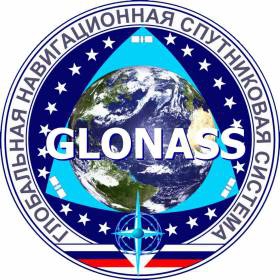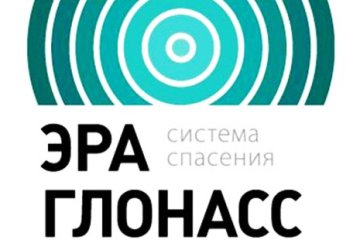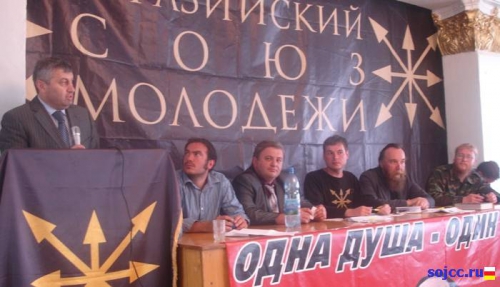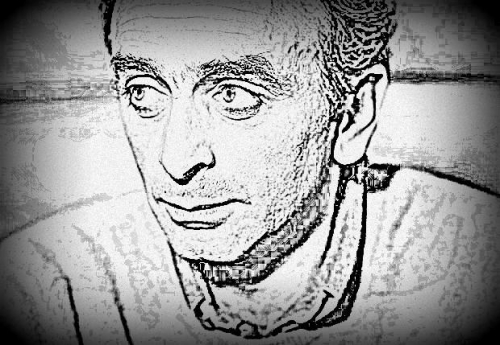samedi, 04 avril 2015
Presseschau - April 2015 (Aussenpolitisches)
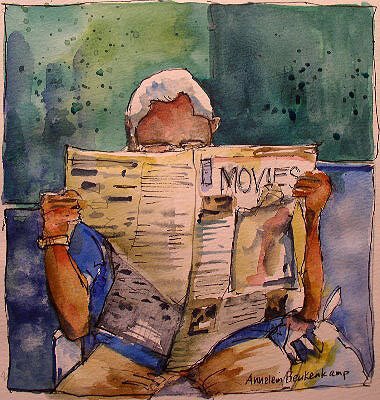
00:05 Publié dans Actualité, Affaires européennes | Lien permanent | Commentaires (0) | Tags : actualité, affaires européennes, europe, allemagne, presse, medias, journaux |  |
|  del.icio.us |
del.icio.us |  |
|  Digg |
Digg | ![]() Facebook
Facebook
Europe-Russie, indispensable entente en Méditerranée...
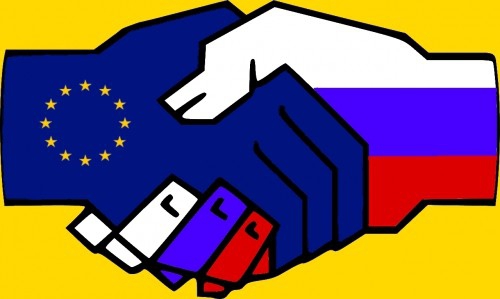
Europe-Russie, indispensable entente en Méditerranée...
par Philippe Migault
Ex: http://metapoinfos.hautetfort.com
Nous reproduisons ci-dessous un point de vue de Philippe Migault, cueilli sur le site d'information russe Sputnik et consacré à l'intérêt d'un partenariat stratégique entre la Russie et l'Europe pour stabiliser la Méditerranée. Philippe Migault est Directeur de recherche à l'Institut de Relations Internationales et stratégiques (IRIS).
Europe-Russie, indispensable entente en Méditerranée
L'opposition déterminée du Kremlin à toute intervention armée de la « communauté internationale » en Syrie en 2013, afin de soutenir la rébellion au régime de Bachar el-Assad, a été l'élément précipitant l'émergence d'un nouveau paradigme international en gestation lente depuis 2003, caractérisé par une tension croissante entre la Russie d'une part, les Etats-Unis et leurs alliés les plus fidèles de l'autre.
S'il est exagéré de parler d'une nouvelle guerre froide, les paramètres géopolitiques et idéologiques différant très sensiblement de ceux qui prévalaient avant 1989, l'expression n'en fait pas moins florès dans la presse occidentale et, notamment, lorsqu'il s'agit d'évoquer la diplomatie russe en Méditerranée. Cette zone, pourtant, n'est pas considérée par les autorités russes comme la plus cruciale du point de vue de leurs intérêts vitaux et, à ce titre, se prête moins que l'Europe orientale à un affrontement avec les Etats-Unis et l'Union européenne.Certes la Méditerranée, dans l'inconscient collectif russe, est un espace chargé de symboles historiques forts. Ceux-ci ne sont pas à négliger dans le cadre de la politique intérieure de la Fédération de Russie, caractérisée par une montée en puissance du patriotisme transcendant toutes les orientations politiques. Espace traditionnel de projection de puissance sous les Tsars, la Méditerranée est considérée comme une aire dans laquelle la voix de la Russie doit être entendue.
Du point de vue de la religion en premier lieu. Depuis la chute de Constantinople en 1453, Moscou a toujours prétendu à la succession spirituelle de l'empire byzantin et, à ce titre, s'est érigée en protectrice des communautés chrétiennes d'Orient. Prétendant régner sur la « troisième Rome » les Tsars ont, en conséquence, multiplié les guerres de conquête contre l'empire ottoman au nom de la défense des communautés chrétiennes des Balkans. La guerre de Crimée, rappelons-le, prend sa source dans la volonté russe de réaffirmer le Primat orthodoxe sur les Lieux Saints de Palestine. Cette vision, toujours vivace au sein d'une opinion publique russe qui, depuis la chute de l'URSS, a opéré un important retour vers la religion, n'est pas à négliger alors que, sur le pourtour méditerranéen, les chrétiens sont aujourd'hui persécutés, que ce soit sur le théâtre syro-irakien, en Egypte ou, précédemment, au Liban.
Du point de vue stratégique ensuite. Menées au nom de la religion, les guerres livrées par la Russie Tsariste en Méditerranée n'avaient pourtant rien de croisades. Plus que la défense de la foi chrétienne, simple prétexte visant à obtenir l'adhésion de la population russe, le véritable objectif a toujours été d'obtenir l'accès aux mers chaudes qui faisait défaut à la Russie, en conquérant Constantinople et les Détroits. Cette politique a produit quelques-unes des plus grandes victoires russes: Tchesmé, Patras, Navarin…La Russie a renoncé depuis longtemps à ses vieilles ambitions. Mais elle entend bien, si nécessaire, défendre ses positions dans la région à l'aide de ses forces armées.Pour autant la Méditerranée n'est pas cruciale pour la Russie. Le débouché de Suez ne lui est pas aussi indispensable. Figurant parmi les premiers producteurs mondiaux de pétrole et de gaz, la Russie n'a pas besoin de garantir un accès permanent et rapide aux hydrocarbures du golfe Persique.
Certes le port de Novorossiïsk, en mer Noire, est le plus important de Russie pour le trafic containers. Installé en eaux profondes (les fonds de la baie Tsemes oscillent entre 21 et 27 mètres), il peut accueillir les plus grands navires. Débouché du Caspian Pipeline Consortium, acheminant en mer noire le pétrole kazakh du gisement de Tengiz, il joue un rôle important dans la politique russe de l'énergie. Port privilégié pour l'importation des produits d'Asie, d'Afrique et d'Amérique latine, notamment les produits agricoles, il retrouve aussi depuis 2003 une importance militaire relative, 300 millions d'euros d'investissements ayant été consentis pour les infrastructures de la base navale depuis 2007.
Mais il ne faut pas oublier que ce potentiel ne peut être exploité à plein. L'activité commerciale de Novorossiïsk est nécessairement limitée compte tenu des règles de navigation du Bosphore, limitant le transit à des bâtiments d'un tonnage maximal de 100 000 tonnes. Incapable d'accueillir, par exemple, les plus grands supertankers, jaugeant 250 000 tonnes, Novorossiïsk est de surcroît enclavée, mal desservie par route et par rail, ce qui restreint son rôle dans le cadre de l'économie russe. Et les autres ports russes en mer noire sont nettement moins aptes encore au grand commerce maritime. Taganrog et Azov sont situés en eaux peu profondes (respectivement 5 et 8 mètres). Le trafic est faible à Touapsé. Il existait un grand projet portuaire à Taman, à l'extrémité de la péninsule éponyme, avec notamment la volonté d'en faire le principal port russe dédié à l'exportation d'ammoniac. Mais le rattachement de la Crimée semble avoir interrompu le projet, les infrastructures portuaires de cette dernière dotant la Russie de nouveaux et précieux atouts maritimes.L'apport de la Crimée est de nature à accroître très sensiblement les capacités navales russes en Mer Noire, donc, dans une certaine mesure, en Méditerranée. Les ports et chantiers navals de Sébastopol, Eupatoria, Féodosia, Kertch, le site d'entraînement pour avions de combat embarqués NITKA de Novofedorovka, additionnés aux capacités navales et aéronavales de Novorossiïsk et de Yeysk, offrent à la Russie la possibilité théorique d'accélérer la modernisation de la flotte de la mer Noire. Celle-ci, vieillissante, devrait recevoir six nouveaux sous-marins et six nouvelles frégates d'ici 2020, ce qui lui permettrait de demeurer la flotte la plus puissante de la région hors Turquie.
Il convient cependant de relativiser le potentiel de croissance qu'offrira la Crimée à la politique russe en Méditerranée, du moins à moyen terme.
Au-delà de l'actuelle faiblesse des moyens industriels et navals, la Russie ne peut guère envisager de mener une politique agressive en Méditerranée pour des raisons géostratégiques évidentes. D'une part en raison de la barrière que continue de représenter le goulet des détroits, dont les deux rives sont contrôlées par la Turquie, Etat membre de l'OTAN. D'autre part parce que la flotte russe est sans doute condamnée à long terme à évoluer en Méditerranée en situation d'infériorité quantitative face aux marines de l'Alliance Atlantique, cette dernière ayant la capacité, de surcroît, d'assurer très facilement sa supériorité aérienne dans l'ensemble du bassin Méditerranéen. Enfin parce que la Russie, en dehors du point d'appui de Tartous, ne dispose d'aucune base navale d'importance sur ce théâtre.
Acteur de second rang comparativement aux puissances riveraines et aux Etats-Unis, la Russie effectue cependant un retour sur la scène méditerranéenne, dont elle s'était retirée depuis la dislocation de l'Union Soviétique. Les autorités russes profitent de circonstances favorables, endogènes et exogènes, les autorisant de nouveau à mener une politique aux ambitions raisonnables.
Endogènes en premier lieu: En dépit de ses actuelles difficultés économiques, la Russie a acquis entre 2000 et 2013 les moyens financiers lui permettant d'apporter son soutien aux Etats de la région, d'acheter amitiés et alliances.
Exogènes ensuite: Alors qu'une désaffection certaine se manifeste en Grèce, à Chypre et dans les Balkans vis-à-vis du modèle européen, compte tenu de la crise affectant l'Union Européenne et des politiques d'austérité drastiques imposée par Bruxelles, la Russie trouve une occasion d'accroître son influence au sein de ces Etats proches par la culture, qu'elle soit slave et/ou orthodoxe. La possibilité pour les forces russes de se voir octroyer des facilités à Chypre, sur la base aérienne de Paphos et dans le port de Limassol, a été évoquée. Membres de l'Union Européenne, la Grèce et Chypre n'ont également pas hésité à acquérir des armes russes, tandis que Vladimir Poutine et Alexis Tsipras, qui doivent se rencontrer le 8 avril prochain, ont multiplié les messages d'amitié l'un envers l'autre.Les exportations d'armement évoquées supra sont l'un des principaux vecteurs permettant à la diplomatie russe de renforcer son influence en Méditerranée. Parce qu'elle a très tôt dénoncé les conséquences des « Printemps arabes » — arrivée au pouvoir de l'Islamisme radical (Egypte, Tunisie), guerres civiles (Syrie), Etats faillis (Libye) — la Russie est considérée par les pays menacés de troubles similaires comme un allié précieux, en mesure de leur fournir les armements susceptibles de maintenir l'ordre en interne et de les protéger d'une éventuelle intervention occidentale.
Réédition du syndrome du barrage d'Assouan, la Russie n'aurait peut-être jamais repris pied en Egypte si les Etats-Unis et leurs alliés occidentaux n'avaient dénoncé avec une telle véhémence la répression de la confrérie des Frères musulmans par le régime du maréchal al-Sissi. Aujourd'hui ce dernier négocie des contrats d'armement avec Moscou représentant un montant total de plus de deux milliards de dollars, discute d'une aide russe permettant à l'Egypte d'élargir le dispositif du Canal de Suez, tandis que les denrées agricoles égyptiennes sont venues remplacer sur les étals russes les marchandises européennes sur lesquelles Moscou a décrété l'embargo.
Le partenariat militaro-industriel avec l'Algérie s'est encore renforcé malgré les mésententes survenues en 2007 lors d'un contrat portant sur la livraison de Mig-29 défectueux.
Quant à l'alliance russe avec la Syrie, alors qu'on évoque timidement la nécessité de rechercher la coopération de Bachar al-Assad pour combattre les Islamistes radicaux de l'Etat Islamique (EI), elle n'a jamais été aussi solide, tant la pertinence des mises en garde russes contre la chute des régimes baasistes a été démontrée par l'absurde.
Et l'influence russe n'est pas spécifique aux Etats arabes. Israël, où vivent aujourd'hui plus d'un million de russophones, entretient également des liens de plus en plus étroits avec la Russie, dans le domaine notamment du renseignement antiterroriste. Tel-Aviv s'est abstenu de voter la résolution des Nations Unies condamnant l'intervention russe en Crimée. L'Etat hébreu, qui a annexé ouvertement (Golan) ou de facto (colonies de Cisjordanie) des territoires étrangers, pouvait, il est vrai difficilement, fustiger la Russie sur ce point alors que Moscou dispose de solides capacités de nuisance à son égard via, notamment, les matériels militaires qu'elle peut fournir à la Syrie ou à l'Iran.
La Russie, au total, ne pèse pas en Méditerranée du même poids qu'une des principales puissances riveraines. Elle n'en renforce pas moins méthodiquement ses positions, notamment depuis le début des « Printemps arabes ».
Cette influence croissante est parfois perçue comme une menace, l'expression d'une volonté expansionniste. Il est pourtant possible de considérer différemment le rôle croissant de la Russie en Méditerranée. Nous partageons avec elle de nombreux intérêts dans la zone, tant du point de vue économique que sécuritaire. Alors que le risque d'attentats islamistes n'a jamais été considéré comme aussi élevé dans l'UE, que l'EI multiplie les atrocités sur le front syro-irakien, que la Libye et la bande sahelo-saharienne sombrent dans l'anarchie et le terrorisme, chacun est conscient que la menace n'est pas la Russie, mais les mouvements wahhabites armés, qui campent aujourd'hui sur les côtes libyennes, à 350 kilomètres de l'Italie.
Dans ce cadre la coopération avec Moscou, qui mène depuis 1994 une guerre sans trêve à ces groupes fondamentalistes, est un atout dont il serait absurde et dangereux de se passer. La France ne serait pas capable d'intervenir au Mali et en République Centrafricaine sans les avions gros porteurs Antonov-124 d'une entreprise détenue à 50% par des actionnaires russes, Volga-Dnepr. Les services de renseignement russes ont régulièrement livré des informations à leurs homologues américains, britanniques, français sur les mouvements terroristes islamistes et réciproquement. Parallèlement les Russes et les Iraniens ont été les premiers, par leur aide matérielle, à soutenir les régimes de Damas et de Bagdad qui, pour être autoritaires, n'en sont pas moins jugés préférables aujourd'hui aux partisans d'Abou Bakr al-Baghdadi par les chancelleries occidentales.Russes et Européens, nous avons le même ennemi, le fanatisme sunnite, menaçant dans l'ensemble de la Méditerranée, quelle que soit la rive considérée. Le plus grand péril, dans l'immédiat, est celui-là. Il faut déterminer en conséquence notre politique de défense et de sécurité et nos relations avec la Russie.
00:05 Publié dans Actualité, Affaires européennes, Eurasisme, Géopolitique | Lien permanent | Commentaires (0) | Tags : actualité, europe, affaires européennes, russie, politique internationale, géopolitique, méditerranée |  |
|  del.icio.us |
del.icio.us |  |
|  Digg |
Digg | ![]() Facebook
Facebook
vendredi, 03 avril 2015
Sanctions antirusses? Les affaires américaines vont bien, merci!
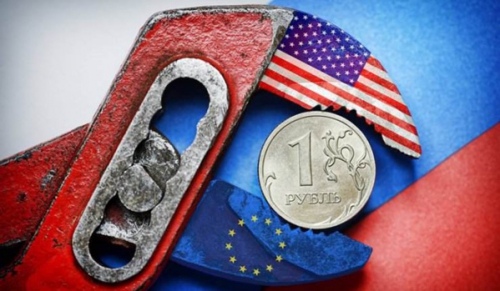
Sanctions antirusses? Les affaires américaines vont bien, merci!
Nous évoquions il y a déjà quelques mois ici et ici à quel point la politique américaine en matière de sanctions antirusses est caractérisée par l’expression « faites ce que je dis, pas ce que je fais ». Les États-Unis continuent à largement s’exempter des sanctions auxquelles ils poussent pourtant l’Union européenne avec insistance.
« Ce n’est pas le moment de faire des affaires avec la Russie. » a communiqué le Département d’Etat américain au sujet des ententes intervenues fin février entre les présidents chypriote et russe. Les Etats-Unis se permettant une fois de plus d’appeler l’Europe à renoncer à la coopération économique avec la Russie, le député russe Alexeï Pouchkov, président de la commission parlementaire de la Douma pour les affaires étrangères, a ironisé sur Twitter : « Les échanges entre les Etats-Unis et la Russie ont progressé de 7% en 2014. Ils exercent des pressions sur l’U. E. et font dans le même temps de l’argent. Pourquoi McDonald’s et Coca-Cola ne soutiennent pas les sanctions d’Obama et ne nous débarrassent pas de leurs produits ? Ils seraient fidèles aux principes, et nous en meilleur santé. »
C’est ainsi que le groupe pétrolier américain ExxonMobil continue tranquillement à travailler en partenariat avec l’entreprise publique russe Rosneft sur un puits de forage en mer de Kara.
Autre exemple : le constructeur aéronautique américain Boeing continue allègrement à travailler avec le consortium russe Aviation Equipment. Aucun des programmes de coopération entre les deux sociétés partenaires n’a été abandonné à cause des sanctions réciproques décrétées par les gouvernements américain et russe.
Et pendant ce temps, l’Espagne, la Grèce et d’autres pays se plaignent du prix à payer pour les sanctions antirusses imposées par l’Union européenne. Pendant ce temps également, le Mistral devant être livré à la Russie l’année dernière attend toujours à Saint-Nazaire, les chantiers navals DCNS/STX déboursant 2,5 millions d’euros par mois pour son entretien et sa sécurité.
- Source : Baudouin Lefranc
00:05 Publié dans Actualité, Affaires européennes, Géopolitique | Lien permanent | Commentaires (0) | Tags : sanctions, europe, affaires européennes, russie, états-unis, politique internationale, géopolitique |  |
|  del.icio.us |
del.icio.us |  |
|  Digg |
Digg | ![]() Facebook
Facebook
mercredi, 01 avril 2015
Germanwings-Absturz: Kriegsakt gegen Deutschland?
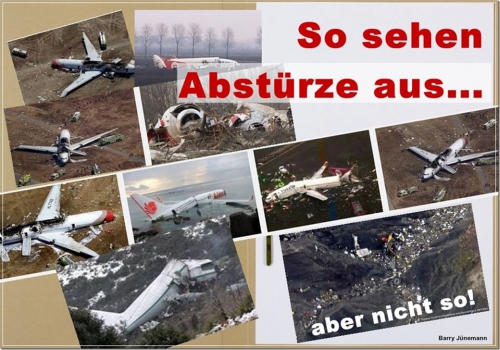
Germanwings-Absturz: Kriegsakt gegen Deutschland?
Daniel Prinz
Ich habe ganz stark den Eindruck, dass wir alle von den Behörden und den Mainstreammedien gehörig an der Nase herumgeführt werden, was die Ursache und die wahren Hintergründe des Germanwings Absturzes betreffen. Die großen Medien bedienen sich dabei einer besonderen Taktik: Während bestimmte Fakten nicht hinterfragt werden (z.B. der Verlust der Speicherkarte des Datenschreibers oder die Rolle der gesichteten Mirage-Kampfjets), werden uns andere Brotkrümel in homöopathischer Dosis verabreicht, die uns wohl unterbewusst zu einer bestimmten Schlussfolgerung führen und auf ein bestimmtes Endergebnis hin programmieren sollen.
Was momentan abläuft, sehe ich daher als Massenpsychologie vom Feinsten. Das ist eine ungeheuerliche Behauptung, meinen Sie? Warten Sie es ab!
Zahlreiche Ungereimtheiten und Vertuschungen
Mein Autorenkollege Gerhard Wisnewski blickte in seinem jüngsten Artikel in die richtige Richtung und stellte genau die richtigen Fragen. Ich hinterfrage grundsätzlich immer alles, und mein Gefühl sagt mir, dass wir weder von der Regierung noch von den Medien jemals die absolute Wahrheit über die wirklichen Ursachen des Germanwings-Absturzes erfahren werden, bestenfalls nur Halbwahrheiten. Wie ich darauf komme?
Nun, beispielsweise behauptet der französische Staatsanwalt Brice Robin, er habe den Tonaufzeichnungen zufolge ein »menschliches Atmen im Inneren des Cockpits« entnehmen können. Bis zum Aufprall sei die ganze Zeit über das »ruhige und regelmäßige Atmen«des Co-Piloten zu hören. Diese Aussagen halte ich für sehr fragwürdig. Wieso? Aus folgendem Grund: Wenn sich ein Flugzeug gerade im Absturz befindet, so wird der Puls eines auch noch so »abgebrühten« Menschen recht hoch sein, und damit einhergehend wird die Frequenz der Atmung alles andere sein, nur nicht »ruhig und regelmäßig« wie in einer entspannten Ruhephase.
Weiterlesen;
00:10 Publié dans Actualité, Affaires européennes | Lien permanent | Commentaires (0) | Tags : allemagne, germanwings, actualité, europe, affaires européennes |  |
|  del.icio.us |
del.icio.us |  |
|  Digg |
Digg | ![]() Facebook
Facebook
Le général Breedlove et the Hybrid War
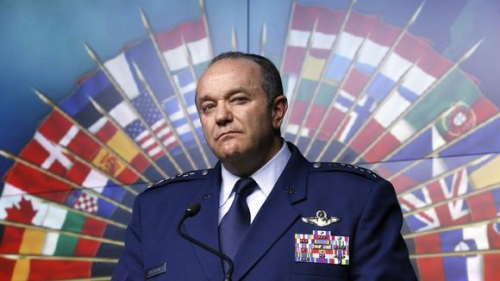
Le général Breedlove et the Hybrid War
Ex: http://www.dedefensa.org
Au Brussels Forum du GMF évoqué par ailleurs (voir le 23 mars 2015 : «[L]a grande fête de l’atlantisme à la fois la plus pompeuse, la plus opulente, la plus indiscutable pour Bruxelles devenue ainsi, pour trois jours, la capitale de l’euroatlantisme...»), nous avons eu droit à un spectacle intéressant, et même instructif, – du moins, selon notre point de vue... Il est bon en effet, dans ce rendez-vous annuel d’une si haute tenue, d’introduire un général significatif, si possible de la puissante cohorte américaniste, pour bien marquer de quel côté se trouve la puissance et de quoi l’on parle exactement. Cette année, comme en 2014 d’ailleurs, c’était le général Breedlove, aviateur de l’USAF devenu pour un temps le commandant en chef suprême des forces alliés en Europe (SACEUR). Interrogé comme on s’attendait qu’il fut, Breedlove a donné des précisions absolument imprécises sur son attitude vis-à-vis de l’Ukraine, du style qui enfonce les portes ouvertes, du type-“toutes les options sont sur la table”, etc. ; envisageant la possibilité de livraisons d’armes tout en disant que cela risquait d’être déstabilisant, envisageant aussi “l’inaction” et disant que cela aussi risquerait d’être déstabilisant. Bref, aucun intérêt sinon la confirmation que Breedlove a bien appris sa leçon...
Passons à autre chose, qui est le cœur de notre sujet. Breedlove se trouvait, avec trois autres invités, placé devant le thème “future of conflict” (l’“avenir de la guerre” ou “le conflit du futur”, etc., les traductions, souvent avec des sens différents, ne manquent pas). Plutôt que s’aventurer dans le prévisionnisme qui ressemblerait aujourd’hui à une sorte de “complotisme du futur” tant les choses sont complexes, le général Breedlove a préféré nous parler simplement du présent, et d’ailleurs un présent qui s’est révélé avoir un passé. Il s’agit de “the Hybrid War”, ou “guerre hybride” comme on l’a aisément compris. (Certains ont aussi parlé de la “guerre furtive”, ou “Stealth war”, – mais laissons-les parler et revenons à l’expression officiellement admise.)
Le général Breedlove a donc exposé que la “guerre hybride”, à défaut d’être le conflit du futur, était certainement celui du présent ; et cette “guerre révolutionnaire” (du point de vue technique) n’est certainement pas nouvelle, nous confie-t-il encore. Effectivement, l’expression “guerre hybride” est employée, notamment, dès le 30 mars 2007, dans un rapport de la colonelle Margaret S. Bond, de la réserve de l’US Army, pour le US Army War College ; l’auteure ajoute que ce type de conflit est également désigné sous l’acronyme de DIME, ce que nous confirme Breedlove ... DIME emprunte, de manière très simple et explicite, les initiales des quatre moyens qui sont utilisés dans ce type de conflit, – Diplomatie, Information, Militaire, Économie. On dira aussitôt que cela non plus n’est pas très nouveau, même par rapport à 2007, que de tous les temps une guerre a recouru de diverses façons aux moyens de la diplomatie, de l’information, de la force militaire et de l’économie. Breedlove en convient d’ailleurs complètement, nous confirmant plus encore la “nouveauté” de cette “guerre révolutionnaire” qui n’a rien de nouveau...
«And frankly, to start off, to sort of demystify it, there is this feeling that it is something new and exciting or different. And it is different, but really, it is a collection of tools that we’ve seen in warfare before. We in the military like to use a simple model when we teach in our schools. We keep everything very simple. So we use a model called DIME, diplomatic, informational, military, and economics. So, as we dissect this hybrid war or this unconventional war that we see being waged today, the new things are how these tools that we have recognized from before are now put together and used in new ways to bring new kinds of pressure diplomatically to attack a capitol, to attack the credibility of the leadership of a nation, diplomatically to try to disassemble those support mechanisms for our capitol, those alliances, those agreements, and other nations that are a part of helping a capitol.»
Effectivement, ce qui constitue un aspect très particulier et sans doute révolutionnaire de la “guerre” dans le Donbass, c’est la façon dont on a usé des différents moyens («the new things are how these tools... are now put together and used in new ways»). Plus précisément, il s’agit sans aucun doute de l’extraordinaire importance prise par le moyen de l’information (c’est-à-dire la communication selon le cadre très large du système de la communication) par rapport, pour l’essentiel, au moyen de l’activité militaire, notamment dans le cas du débat sans fin sur l’intervention ou pas de l’armée russe en tant que telle dans le Donbass. L’intérêt est donc dans l’interconnexion entre le moyen de l’information (de la communication) et le moyen militaire. On s’attache à ce qu’en dit Breedlove dans cette intervention initiale dont on a déjà donné un extrait, où il expose les définitions des composants de l’acronyme DIME, et précisément, pour notre cas, les deux moyens de l’information (de la communication) et du militaire. (Comme on le lit, il dit fort peu de choses de l’aspect diplomatique qui est intervenu d’une façon conventionnelle et l’on laisse également l’aspect économique où rien de révolutionnaire n’est intervenu, mais plutôt une utilisation massive des moyens habituels de la guerre économique, des sanctions aux manipulations financières.)
«So, first, in a diplomatic way, to attack credibility and to try to separate a nation from its support mechanisms. Informationally, this is probably the most impressive new part of this hybrid war, all of the different tools to create a false narrative. We begin to talk about the speed and the power of a lie, how to get a false narrative out, and then how to sustain that false narrative through all of the new tools that are out there, the social media tools, the way that we can use the internet and purchasing and employing those informational tools that get this narrative out.
»Militarily, of course, the military tools are relatively unchanged, but how they are used or how they are hidden in their use, is the new part of this hybrid war. How do we recognize, how do we characterize and then how do we attribute this new employment of the military in a way that is built to bring about ambiguity? Employed to bring about ambiguity. And that ambiguity, then, to either be embraced by those who want to embrace it or attacked by those who see the subversiveness of it. And then, if that sort of unattributable use of the military doesn’t work, and the objectives are not being met, then a more overt use of the military.»
Le premier passage, qui concerne la section “guerre de la communication” (plutôt que “guerre de l’information”) est intéressant malgré sa brièveté, dans l’esprit même de la dialectique employée. Il n’est plus question de “désinformation”, de “mésinformation”, etc., qui sont des techniques employées par rapport à la réalité, mais bien de narrative en tant que telles qui sont effectivement, presque inconsciemment mais d’une manière extrêmement convaincante pour notre interprétation, présentées comme des objets ou des concepts en soi et non plus des méthodes. On voit bien que Breedlove s’attache moins à la question de la méthode pour influencer la perception de la réalité qu’au constat implicite qu’il doit exister des narrative, qui sont des objets en soi présentant d’une façon autonome une réalité complètement faussaire, des moyens accomplis et autonomes de la “guerre hybride”. Certes, l’emploi par Breedlove du qualificatif “faux” [false] s’adresse bien entendu dans sa position conformiste appuyée fermement sur sa psychologie de l’inculpabilité aux affirmations russes, à ce que lui, Breedlove, juge être leur narrative ; mais cet emploi prend finalement la résonnance d’une redondance inutile mais également extrêmement significative, lorsqu’il est correctement interprété.
La narrative selon Breedlove est un outil de la guerre, donc il n’a pas de nationalité, et dire que la narrative est false n’a pas grand sens puisque la narrative n’est pas construite en référence à la réalité, mais pour sa valeur propre comme outil d’influence sur la marche de la guerre. Implicitement, d’ailleurs, le discours de Breedlove impliquant cette indifférence de la narrative par rapport à la réalité et en faisant un outil essentiel indiquent que la technique est d’usage courant du côté US, car les USA n’ont aucunement l’habitude, par leur doctrine de masse et de force, de ne pas employer un outil de la guerre dès lors qu’ils en connaissent l’existence et peuvent en disposer, – ils utilisent tous les moyens, et puisque la narrative en est un reconnu par eux, ils l’utilisent donc nécessairement. C’est une attitude et une conception que ne partagent pas les Russes, qui, s’ils admettent qu’il existe des formes de “guerre hybride“, ne font pas de la narrative un moyen en soi, sans rapport avec la réalité. Pour eux, la réalité existe encore, et ils se soumettent donc à la logique de la “vérité de situation” ; nous soupçonnons bien entendu que ce n’est aucunement le cas du côté US. (Bien entendu, Breedlove, n’ayant guère d’intérêt pour l’existence d’une “vérité de situation”, n’imagine pas une seconde que puisse exister le phénomène du déteminisme-narrativiste. C’est dire implicitement qu’il y est d’autant plus enchaîné.)
L’autre aspect évoqué par Breedlove dans l’extrait cité, — l’aspect militaire, — est très intéressant surtout lorsqu’il est mis en rapport avec l’extrait sur le moyen de la communication (narrative). Dans cette partie, Breedlove revient exactement à ce qu’il nous disait il y a exactement un an, lors du précédent Brussels Forum, lorsqu’il décrivait l’extraordinaire insaisissabilité, pour les observateurs, des opérations russes qui aboutirent à détacher la Crimée du contrôle de Kiev, pour laisser s’organiser le référendum jusqu’à la sécession et au rattachement à la Russie (voir le 24 mars 2014). Il décrit l’activité du “moyen militaire” en répétant le même mot, – “ambiguïté”, – bien entendu en référence à cette expérience de la crise ukrainienne à partir de mars 2014 («How do we recognize, how do we characterize and then how do we attribute this new employment of the military in a way that is built to bring about ambiguity? Employed to bring about ambiguity. And that ambiguity, then, to either be embraced by those who want to embrace it or attacked by those who see the subversiveness of it»). Le problème qui apparaît alors est de savoir comment réconcilier ce fait même de l’ambiguïté de l’activité militaire, c’est-à-dire de l’extrême difficulté à l’impossibilité de l’identifier précisément, de la localiser, de la décrire et de la comprendre, avec le fait de la narrative qui, au contraire, prétend vous montre une réalité tranchée, claire et évidente de la responsabilité et de la fourberie de l’adversaire dans le chef de son activité militaire mise au grand jour, sans la moindre ambiguïté. Comment réconcilier cette “ambiguïté” dont tout montre que Breedlove l’a reconnue pour ce qui concerne l’activité des forces russes sur le théâtre général de cette crise, notamment en Crimée, avec ses propres diverses clameurs, dans les quatre ou cinq deniers mois, proclamant que des unités russes étaient engagées, qu’elles étaient en nombre important et précisés (quoique changeant d’une version à l’autre) ? D’un côté, on affirme que ce qui caractérise l’activité militaire, c’est l’impossibilité de la mesurer et de l’identifier exactement, de l’autre on proclame que cette activité militaire est massive, comme si on l’avait exactement mesurée et identifiée.
Ainsi peut-on déterminer la faiblesse de l’exposé de Breedlove, en ceci que son affirmation que la narrative est une arme de communication est une déclaration unilatérale. Effectivement, comme on l’a vu plus haut, les Russes n'ont jamais accepté cette définition et cette conception, affirmant qu’ils rendaient compte de la réalité des choses en affirmant n’être pas intervenus en unités régulières dans le Donbass, et donc affirmant de facto qu’il existait bien une “vérité de la situation”. Breedlove, lui, officialise le montage et l’usage de la narrative, impliquant que le côté US/BAO considère cette “arme” et l’utilise effectivement, ce qu’il montre et démontre a contrario et involontairement par le passage qui suit. A cet égard, on peut conclure que les élites-Système du bloc BAO, d’une façon ou d’une autre, sont emprisonnées au déteminisme-narrativiste de deux façons : d'une part au niveau du contenu des narrative qu’elles développent en se faisant croire à elles-mêmes qu’elles les contrôlent (aspect “technique” de cette “‘arme de guerre”), mais en croyant le plus souvent, ou en étant obligées de croire à leur contenu, et ainsi conduites à justifier de ce contenu jusqu’au terme de la logique ; d'autre part, au niveau de la méthodologie, par cette façon exposée par Breedlove de donner à la narrative un statut majeur dans la “guerre hybride” alors qu’elle n’y figure pas précisément dans l’arsenal russe. C’est, par un curieux raccourci, affirmer la réalité sinon la vérité d’une technique dont on explique par ailleurs qu’elle est toute entière bâtie sur la manipulation, le simulacre et le mensonge, – le très puissant, le surpuissant mensonge, comme arme-Système, auquel Breedlove rend un très étrange hommage en parlant de «...the speed and the power of a lie». On conviendra que cette extrême complication, ou cette extrême sophistication d’une pensée évidemment sophiste dans le sens très péjoratif du mot, rend particulièrement difficile, après les avoir perdues, d’espérer retrouver un jour une “vérité de situation”, sinon la réalité elle-même. C’est là la fondamentale et mortelle faiblesse du bloc BAO, enchaîné au Système et à sa politique de déstructuration et de dissolution, – ici poussée à l’extrême, déstructuration et dissolution de la réalité, alors que le champ d’action continue à être une crise ukrainienne bien réelle, elle...
00:05 Publié dans Actualité, Affaires européennes, Défense | Lien permanent | Commentaires (0) | Tags : guerre hybride, hybrid war, otan, russie, ukraine, europe, états-unis, affaires européennes, militaria, guerre, polémologie |  |
|  del.icio.us |
del.icio.us |  |
|  Digg |
Digg | ![]() Facebook
Facebook
mardi, 31 mars 2015
A320: Une autre version possible
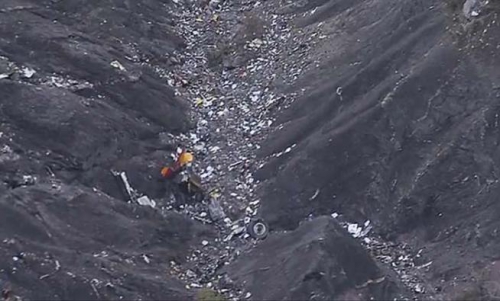
A320: Une autre version possible
Il semble bien que le très puissant complexe militaro-industriel via différentes officines et administrations ait atteint un tel degré de monstruosité et les politiques un tel degré d’aveuglement, de complicité ou de soumission que tout, vraiment tout, est imaginable.
Bien sûr, la facilité est de classer toute tentative de compréhension des événements dans le fourre-tout « complot », comme ça, on est sûr qu’une grande partie de la population ne se risquera pas à les suivre. Des fois qu’ils auraient l’air d’imbéciles… Et puis, la réalité est parfois plus terrorisante que l’illusion. Alors, on ferme les écoutilles, c’est plus confortable.
Ceci dit, l’article qui suit n’est pas pour moi forcément la vérité. Elle pourrait l’être ce qui n’est pas pareil.
A vous de voir.
Obama furieux par l’incident de l’A320 Germanwings, refuse de rencontrer les dirigeants de l’OTAN pour s’expliquer
« Un nouveau rapport publié par le Service de renseignements Russe ( SVR ) qui déclare aujourd’hui que le président Barack Obama est furieux que le Vol 9525 Germanwings AIT ÉTÉ ABATTU, dans le sud de la France, pendant les «manœuvres» de l’OTAN, tuant 150 passagers. Barack Obama a scandaleusement refusé de rencontrer le commandant en chef de l’alliance occidentale, le secrétaire général, Jens Stoltenberg, malgré les demandes répétées de cellui-ci ».
Obama était également furieux du fait que deux ingénieurs du Pentagone faisaient partie des vicitimes du vol 9525 de Germanwings, des victimes specialisées dans les radars ou justement, peut-être spécialistes du système de défense High Energy Liquid Laser Area (HELLADS) qui sert actuellement secrètement, dans les operations de l’OTAN contre la Fédération de Russie. Cette catastrophe qui serait en fait un accident révélant de la sorte l’existence de cette arme mal controlée par les États-Unis et mettant en danger la sécurité des avions civils du monde entier.
« Le crash du vol 9525 de Germanwings est en rapport avec les manœuvres de l’OTAN sur l’Ukraine, le ministère de la Défense ( MoD ) avait précédemment rapporté l’échec d’un test de » l’US Air Force et de son système de défense High Energy Liquid Laser Area (HELLADS) sur la base aérienne d’Aviano en Italie, dans une tentative d’abattre un avion porteur de type nucléaire de la Fédération de Russie. Le SVR a noté dans son rapport que le président Obama avait connaissance des dangers de ce test laser pour les vols de l’aviation civile lors des manœuvres au début du mois, après un test similaire qui avait presque causé la destruction de l’avion civil LH1172 Lufthansa en France, il y a deux semaines, et c’est exactement de cette façon que le vol 9525 Germanwings a été descend/abattu rapidement avant que les pilotes et les contrôleurs de vol puissent reprendre le contrôle de l’appareil.
Plus intéressant encore, dans le rapport du SVR, demeurent ce qu’il nomme la «couverture massive» des agences de renseignement occidentales visant à garder les citoyens dans l’ignorance de la vérité de ce qui est véritablement arrivé au vol 9525 Germanwings et de charger, de blâmer le copilote Andreas Lubitz.
L’opération de camouflage de la catastrophe du vol 9525 de Germanwings , selon ce rapport publié par le SVR, est menée par une unité spécialisée du Federal Bureau of Investigation (FBI) à la demande de l’Union Européenne qui, comme dans tous les incidents précédents de ce type, et sans connaître tous les faits, affirme avec force que l’accident est dû au terrorisme .
En revanche, les experts du SVR dans leur rapport, attestent d’une part de la certitude que l’avion n’a pas été abattu sous prétexte de terrorisme, les services de renseignement occidentaux, dirigés par le FBI, inondent de leur côté les médias avec des rapports indiquant que le co-pilote Lubitz, est en fait un terroriste … qui a bloqué le pilote à l’extérieur du cockpit, puis, qui a délibérément mis sur une trajectoire de collision le vol sur les montagnes françaises. »
Un beau scénario auquel tout le monde croit, même le député UMP Bernard Debré qui déclare au journal Le Point que « Le traitement du copilote est sans doute responsable du drame » alors qu’il n’en sait rien ; la Clinique en Allemagne n’a communiqué aucun élément, ni sur le service qui aurait accueilli le jeune pilote, ni sur son traitement, il aurait très bien pu être victime d’une maladie honteuse, on en saurait pas d’avantage, et peut-être que ce pilote que la propagande médiatique accuse pour dissimuler la vérité sur l’implication d’une arme secrète américaine, a tout fait pour sauver l’avion avec son commandant de bord. Cela nous indique également que nos dirigeants seraient complices et savent la vérité, autant F. Hollande qu’Angella Merkel et les autres et tout cela pour garder secrète l’implication et les erreurs des américains d’où la colère de M. Obama.
« De toutes les photos du site de la catastrophe du vol 9525 de Germanwings, qui montrent des milliers de fragments éparpillés sur une vaste zone de plusieurs centaines d’hectares, avec de nombreux ruisseaux et montagnes, sans un seul point d’impact identifiable, on peu naturellement venir à la conclusion logique que le vol 9525 Germanwings a explosé dans les airs, selon ce rapport, et l’objectif principal de la couverture des services de renseignements occidentaux est de distraire le public de ce qu’il voit, le forçant à se concentrer sur l’idée du jeune terroriste comme « bouc émissaire ».
« Cette tactique de l’enfumage est très bien connue des services de sécurité et de propagande, le rapport explique, qu’elle a été utilisé avec beaucoup de succès en 2001, concernant l’attaque du 11 Septembre sur le Pentagone, où le peuple américain a été « convaincu » qu’un avion détourné avait frappé le Pentagone de plein fouet, malgré les premiers rapports de CNN indiquant que cet attentat n’était pas couronnée de succès, alors que les images du trou dans le bâtiment démontrait la taille d’un missile de croisière, et non celle d’un avion de ligne ».
Malheureusement, conclut le rapport, les Occidentaux ne sauront jamais la vérité de ce qui est arrivé au vol 9525 de Germanwings , étant donné que leurs gouvernements connaissent les conséquences qui pourraient s’attendre si la vérité était connue ».
Ainsi se termine l’article, chacun en pensera ce qu’il voudra, nous avons là une autre version qui mérite que l’on s’y attarde.
Nous vivons une époque formi-diable…
- Source : Aurora
14:42 Publié dans Actualité, Affaires européennes | Lien permanent | Commentaires (2) | Tags : a320 germanwings, otan, europe, affaires européennes, actualité |  |
|  del.icio.us |
del.icio.us |  |
|  Digg |
Digg | ![]() Facebook
Facebook
lundi, 30 mars 2015
Russia, Europe to Create Common Road Safety Space - GLONASS Union
|
||
Russia, Europe to Create Common Road Safety Space - GLONASS Union |
||
|
"The systems operating in the EEU countries will be harmonized with the European eCall [system] and, eventually, a common road safety space will be created to cover all of Eurasia – everybody is a winner," GLONASS Union Vice President for Strategic Development Evgeniy Belaynko told RIA Novosti. Armenia and Kyrgyzstan, the other two EEU nations, are in talks to introduce the ERA-GLONASS accident response system. The ERA-GLONASS system provides data to emergency responders from Russia"s Global Navigation Satellite System. It is designed to reduce emergency service arrival times by quickly pin-pointing incident sites. The system calls an emergency service number automatically if the on-board transponder signals an accident. China will train its satellite navigation experts on Russian soil as part of a broader plan to expand cooperation on satellite navigation systems, a vice president for Russian non-profit partnership GLONASS Union told RIA Novosti. "The Chinese are going to send specialists to us for training every year. A corresponding accord has already been reached," Evgeniy Belyanko, GLONASS Union Vice President for Strategic Development, said. A source at the Russian space agency Roscosmos told RIA Novosti in February that Russia and China had signed a cooperation deal in the field of satellite navigation. "We continue to work under the cooperation program. What needs to be done first is to harmonize the standards of emergency navigation systems in transport, before we get on to develop major projects and technology," Belyanko said. He added the two nations had set up working groups and four subcommittees to discuss compatibility in their corresponding navigation systems.
GLONASS, which stands for Global Navigation Satellite System, was launched in 1993. It is considered to be Russia's version of the US Global Positioning System (GPS). Moscow leads with on-board emergency call systems that export the ERA-GLONASS technology standard, a senior official for Russian non-profit partnership GLONASS Union said. "We have been the first to create a massive, reliable in-vehicle emergency system that spans the territory of the entire country, and we did it three years and three months before the European Union, developing a critically important technology," GLONASS Union Vice President for Strategic Development Evgeniy Belyanko said in an interview with RIA Novosti. Beginning in March 2018, all new cars sold in the 28-nation European Union must be outfitted with emergency call technology eCall, according to new regulations. The Russian-made technology has been in use since the beginning of this year. Belyanko said the United Nations is already using ERA-GLONASS technology as a template for its system requirements. "Russian experts are the driving force behind this effort to set out unified rules. We have virtually started to export knowledge," Belyanko said. ERA-GLONASS is a real-time satellite technology used in reporting traffic accidents. It calls the 112 emergency service number automatically in case of an accident. The communication takes under 20 seconds. Rules that came into force in 2015 require cars licensed in the Customs Union, Russia, Belarus and Kazakhstan, to be equipped with ERA-GLONASS technology. |
||
00:05 Publié dans Actualité, Affaires européennes | Lien permanent | Commentaires (0) | Tags : glonass, era, europe, affaires européennes, espace, gps, russie, télécommunications |  |
|  del.icio.us |
del.icio.us |  |
|  Digg |
Digg | ![]() Facebook
Facebook
EEUU impone sanciones contra Alexander Dugin, la Unión Euroasiática de la Juventud, y dos de sus dirigentes
Los sancionados eurasistas son Alexander Dugin, Andrey Kovalenko, y Pavel Kanishchev, además de la Unión Euroasiática de la Juventud.
Las sanciones congelan los bienes de los señalados e impide a cualquier entidad financiera de Estados Unidos hacer negocios con los individuos o instituciones sancionados. Estas sanciones siguen los pasos de las acciones emprendidas por la Unión Europea y Canadá el pasado 16 de febrero, que fueron prorrogadas la semana pasada. Por otra parte, incluyen a Oleg Kozyura, jefe del Servicio Federal de Migración de Rusia en Sebastópol (Crimea), al que EE.UU.
EFE | ÚN.- Estados Unidos anunció hoy nuevas sanciones contra una entidad financiera rusa, una organización política, y catorce personas, entre ellos el ex primer ministro de Ucrania Mykola Azárov, por su papel en el conflicto en el este del país.
Las sanciones congelan los bienes de los señalados e impide a cualquier entidad financiera de Estados Unidos hacer negocios con los individuos o instituciones sancionados.
“Desde el inicio de esta crisis, hemos demostrado que vamos a imponer costos a los que violan la soberanía y la integridad territorial de Ucrania”, indicó el subsecretario interino para Terrorismo e Inteligencia Financiera del Departamento del Tesoro de EE.UU., Adam Szubin, en un comunicado.
Entre los sancionados también hay dos altos funcionarios del Gobierno del expresidente de Ucrania Víktor Yanukóvich.
Esos señalados son el ex primer viceministro Serhiy Arbuzov y la exministra de Salud Raisa Bogatyrova, que está siendo investigada por malversación de fondos estatales “a gran escala” y la transferencia ilegal de estos fondos fuera del país.
El Departamento del Tesoro indicó que los sancionados han sido incluidos en su “lista negra” por ser responsables o cómplices de “amenazar la paz, la seguridad, la estabilidad, la soberanía y la integridad territorial de Ucrania”.
El listado también incluye ocho a separatistas ucranianos y un pro-separatista ruso, así como la organización Unión Euroasiática de la Juventud, rama juvenil del ultranacionalista Movimiento Euroasiático ruso, a la que EE.UU. acusa de estar reclutando individuos con experiencia militar para combatir en Ucrania.
Se trata de Roman Lyagin, que sirvió como jefe de la Comisión Electoral Central de la autoproclamada República Popular de Donetsk; su ex “ministro de Defensa”, el comandante rebelde Serhii Zdriliuk; el ex “ministro de Seguridad”, Alexander Khodakovsky, y Alexandr Karaman, que ha ejercido varios cargos en el gobierno de esa región.
Figuran, además, Ekaterina Gubareva, ex “ministra de Exteriores”, de la autoproclamada República Popular de Donetsk; así como los líderes de la autoproclamada República Popular de Lugansk Sergei Abisov y Yuriy Ivakin.
Por otra parte, incluyen a Oleg Kozyura, jefe del Servicio Federal de Migración de Rusia en Sebastópol (Crimea), al que EE.UU. acusa de la expedición sistemática y rápida de pasaportes rusos a residentes en Crimea.
Además, también sancionó al Banco Comercial Nacional Ruso, al que el Tesoro acusa de trasladarse a la región ucraniana de Crimea después de que Moscú se anexionase ese territorio en 2014.
Estas sanciones siguen los pasos de las acciones emprendidas por la Unión Europea y Canadá el pasado 16 de febrero, que fueron prorrogadas la semana pasada.
“Si Rusia sigue apoyando la actividad desestabilizadora en Ucrania y viola los acuerdos y la puesta en práctica del plan de Minsk (para lograr una solución pacífica al conflicto), los costos sustanciales que ya enfrenta seguirán aumentando”, advirtió Szubin.
Fuente: Libreprensa

Originales del Departamento del Tesoro de los EEUU:
Treasury Announces New Designations of Ukrainian Separatists and their Russian Supporters
3/11/2015
Action Targets Eight Ukrainian Separatists, a Russian Pro-Separatist Organization and Three of its Leaders, a Crimean Bank, and Three Former Yanukovych Officials
WASHINGTON – The United States supports the Minsk agreements and views them as the best means to a diplomatic resolution of the conflict in eastern Ukraine. The proof of Russia’s peaceful intentions in Ukraine would be in its full and unambiguous implementation of the September Minsk agreements and the February 12 Minsk Implementation Plan. Recent assaults by Russian-armed separatists, however, particularly those that have targeted Debaltseve and Mariupol – two cities that unquestionably lie outside of separatist-occupied territory according to the September 19 ceasefire line – constitute violations of the letter and spirit of the Minsk agreements.
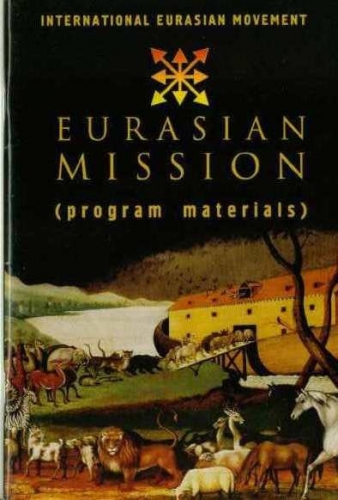 As part of an ongoing effort to hold accountable those responsible for violations of Ukraine’s sovereignty and territorial integrity, the U.S. Department of the Treasury today imposed sanctions on eight Ukrainian separatists and one pro-separatist Russian entity and its leaders pursuant to E.O. 13660 for being responsible for or complicit in actions or policies that threaten the peace, security, stability, sovereignty, or territorial integrity of Ukraine, for being leaders of such entities, or for asserting governmental authority over a part or region of Ukraine without the authorization of the Government of Ukraine. Additionally, Treasury today designated and blocked the assets of one bank pursuant to E.O. 13685 for operating in the Crimea region of Ukraine, and three individuals pursuant to E.O. 13660 for the misappropriation of state assets of Ukraine. These sanctions follow similar action taken by the European Union and Canada on February 16. We continue to work to remain in lockstep with our international partners in our efforts to incentivize a diplomatic resolution to the crisis in Ukraine.
As part of an ongoing effort to hold accountable those responsible for violations of Ukraine’s sovereignty and territorial integrity, the U.S. Department of the Treasury today imposed sanctions on eight Ukrainian separatists and one pro-separatist Russian entity and its leaders pursuant to E.O. 13660 for being responsible for or complicit in actions or policies that threaten the peace, security, stability, sovereignty, or territorial integrity of Ukraine, for being leaders of such entities, or for asserting governmental authority over a part or region of Ukraine without the authorization of the Government of Ukraine. Additionally, Treasury today designated and blocked the assets of one bank pursuant to E.O. 13685 for operating in the Crimea region of Ukraine, and three individuals pursuant to E.O. 13660 for the misappropriation of state assets of Ukraine. These sanctions follow similar action taken by the European Union and Canada on February 16. We continue to work to remain in lockstep with our international partners in our efforts to incentivize a diplomatic resolution to the crisis in Ukraine.
“From the start of this crisis, we have demonstrated that we will impose costs on those who violate the sovereignty and territorial integrity of Ukraine. That includes individuals, organizations, businesses, and the governments that support them,” said Acting Under Secretary for Terrorism and Financial Intelligence Adam J. Szubin. “If Russia continues to support destabilizing activity in Ukraine and violate the Minsk agreements and implementation plan, the already substantial costs it faces will continue to rise.”
Undermining Ukraine’s Sovereignty – Executive Order 13660
Roman Lyagin has served as the chairman of the Central Election Commission (CEC) and as minister of social and labor policy of the self-proclaimed Donetsk People’s Republic (DPR). In his role as CEC chairman, he helped organize a number of votes in the region that were denounced as illegal by the government of Ukraine in Kyiv, including a May 2014 “independence referendum” and a November 2014 election for leadership positions in the self-proclaimed DPR. In addition, Lyagin actively interfered with the internationally-recognized national Ukrainian elections by confiscating ballots and preventing voting in the May 2014 Ukrainian parliamentary elections and the October 2014 election for Ukraine’s President. He has been designated for having asserted governmental authority over a part or region of Ukraine without the authorization of the Government of Ukraine, and for having engaged in actions that have undermined democratic processes in Ukraine.
Yuriy Ivakin is being designated pursuant to E.O. 13660 for asserting governmental authority over a part or region of Ukraine without the authorization of the Government of Ukraine, and for being a leader of the self-proclaimed Luhansk People’s Republic (LPR), an entity whose property and interest in property are blocked by this order. Ivakin has led the ministry of internal affairs of the self-proclaimed LPR. In May 2014, Ivakin, accompanied by representatives of the self-proclaimed LPR, entered the regional directorate of the Ukrainian Ministry of Internal Affairs in Luhansk and declared himself the head of the regional directorate.
Aleksandr Karaman has held a number of leadership posts within the self-proclaimed DPR, including minister for social and labor policy, foreign minister, deputy prime minister, and deputy chairman of the council of ministers. Karaman is being designated for being a leader of the self-proclaimed DPR, and for threatening the peace, stability, sovereignty, and territorial integrity of Ukraine.
Oleksandr Khodakovskyy is being designated pursuant to E.O. 13660 for being responsible for or complicit in actions or policies that threaten the peace, security, stability, sovereignty, or territorial integrity of Ukraine, and for asserting governmental authority over a part or region of Ukraine without the authorization of the Government of Ukraine. Khodakovskyy is the former head of the self-proclaimed DPR security service, and is the chief of the Vostok Battalion, a unit of the DPR militia that engaged in fighting with the Ukrainian military at Donetsk Airport.
Senior “rebel commander” Serhii Zdriliuk served as an aide to Igor Girkin (a.k.a Igor Strelkov), former “defense minister” of the self-proclaimed DPR. Zdriliuk and Girkin were involved in the takeover of Ukraine’s Crimea region that led to Russia’s illegal annexation of the region in March 2014. He is being designated for actions that threaten the territorial integrity of Ukraine, and has acted on behalf of the self-proclaimed DPR. Girkin was designated in June 2014 pursuant to E.O. 13660.
The Eurasian Youth Union has actively recruited individuals with military and combat experience to fight on behalf of the self-proclaimed DPR and has stated that it has a covert presence in Ukraine. Aleksandr Dugin, Andrey Kovalenko, and Pavel Kanishchev are leaders of the Eurasian Youth Union. This group and its leaders are being designated for being responsible for or complicit in actions or policies that threaten the peace, security, stability, or sovereignty or territorial integrity of Ukraine.
Ekaterina Gubareva is being designated for being responsible for or complicit in actions or policies that threaten the peace, security, stability, sovereignty, or territorial integrity of Ukraine. Gubareva previously held the title of foreign minister of the self-proclaimed DPR, and has engaged in efforts to transfer funds from Russia to the DPR. She was a signatory to an October 2014 statement signed by self-proclaimed DPR and LPR leaders and representatives refusing to return to the Government of Ukraine control of the Ukrainian side of the international border with Russia.
Sergei Abisov was appointed minister of interior affairs of the self-proclaimed Republic of Crimea in May 2014. Abisov is being designated because he has asserted governmental authority over a part or region of Ukraine without the authorization of the Government of Ukraine.
Oleg Kozyura is the head of the Federal Migration Service of Russia in Sevastopol, Crimea, and is responsible for the systematic and expedited issuance of Russian passports for the residents of Crimea. As leader of the Federal Migration Service of Russia in Sevastopol, Kozyura facilitated the issuance of more than 260,000 Russian passports to the citizens of Sevastopol and other regions. Kozyura is being designated because he leads an entity that has, or whose members have, asserted governmental authority over a part of Ukraine without the authorization of the Government of Ukraine.
Crimean Bank – Executive Order 13685
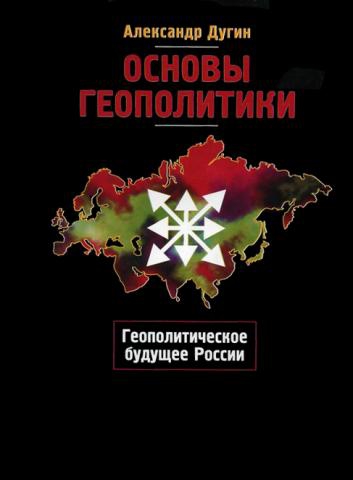 Russian National Commercial Bank (RNCB) is being designated today pursuant to E.O. 13685 for operating in the Crimea region of Ukraine. RNCB had no presence in the Crimea region of Ukraine prior to its occupation and attempted annexation by Russia and Russian authorities have used the bank to facilitate its illegal efforts to incorporate Crimea into the Russian Federation. Following the annexation, RNCB bought or took over branches of retreating banks and now operates the largest banking network in Crimea.
Russian National Commercial Bank (RNCB) is being designated today pursuant to E.O. 13685 for operating in the Crimea region of Ukraine. RNCB had no presence in the Crimea region of Ukraine prior to its occupation and attempted annexation by Russia and Russian authorities have used the bank to facilitate its illegal efforts to incorporate Crimea into the Russian Federation. Following the annexation, RNCB bought or took over branches of retreating banks and now operates the largest banking network in Crimea.
Former Yanukovych Officials and Misappropriation of Ukrainian State Assets – Executive Order 13660
Mykola Azarov is the former Prime Minister of Ukraine. Azarov is being designated because he is responsible for the misappropriation of state assets of Ukraine.
Serhiy Arbuzov is the former First Deputy Prime Minister and former acting Prime Minister of Ukraine. He is being designated for acting on behalf of former Ukrainian President Viktor Yanukovych as First Deputy Prime Minister and as a member of Yanukovych’s inner circle. Arbuzov was a leading member of a group of Yanukovych political appointees responsible for key economic positions in the government.
Raisa Bohatyriova is the former Minister of Health of Ukraine. She is currently under investigation in Ukraine for the large-scale embezzlement of state funds and the illegal transfer of those funds outside the territory of Ukraine. She is being designated for the misappropriation of state assets of Ukraine.
All the individuals and entities designated today are blocked. Their property and interests in property within U.S. jurisdiction are frozen and U.S. persons are generally prohibited from doing business with them.
For identifying information on the individuals and entities named in this release, please click here.
###
Fuente: ht tp://www.treasury.gov/press-center/press-releases/Pages/jl9993.aspx
Ukraine-related Designations
3/11/2015
OFFICE OF FOREIGN ASSETS CONTROL
Specially Designated Nationals List Update
The following individuals have been added to OFAC’s SDN List:
ABISOV, Sergei (a.k.a. ABISOV, Sergei Vadimovich); DOB 27 Nov 1967; POB Simferopol, Crimea, Ukraine (individual) [UKRAINE-EO13660].
ARBUZOV, Serhiy (a.k.a. ARBUZOV, Sergey G.; a.k.a. ARBUZOV, Serhiy Hennadiyovych); DOB 24 Mar 1976; POB Donetsk, Ukraine; Former First Deputy Prime Minister of Ukraine (individual) [UKRAINE-EO13660].
AZAROV, Mykola Yanovych (a.k.a. AZAROV, Mykola Nikolai Yanovych; a.k.a. PAKHLO, Nikolai Yanovich); DOB 17 Dec 1947; POB Kaluga, Russia; Former Prime Minister of Ukraine (individual) [UKRAINE-EO13660].
BOHATYRIOVA, Raisa Vasylivna (a.k.a. BOGATYRIOVA, Raisa; a.k.a. BOGATYROVA, Raisa; a.k.a. BOGATYRYOVA, Raisa; a.k.a. BOHATYREVA, Raisa; a.k.a. BOHATYROVA, Raisa; a.k.a. BOHATYRYOVA, Raisa; a.k.a. BOHATYRYOVA, Rayisa); DOB 06 Jan 1953; POB Bakal, Chelyabinsk, Russia (individual) [UKRAINE-EO13660].
DUGIN, Aleksandr (a.k.a. DUGIN, Aleksandr Gelyevich; a.k.a. DUGIN, Alexander Gelyevich); DOB 07 Jan 1962 (individual) [UKRAINE-EO13660].
GUBAREVA, Ekaterina (a.k.a. GUBAREVA, Yekaterina); DOB 05 Jul 1983 (individual) [UKRAINE-EO13660].
IVAKIN, Yuriy Vladimirovich (a.k.a. IVAKIN, Yurii); DOB 13 Aug 1954; POB Perevalsk, Ukraine (individual) [UKRAINE-EO13660].
KANISHCHEV, Pavel; DOB 1986 (individual) [UKRAINE-EO13660].
KARAMAN, Aleksandr (a.k.a. CARAMAN, Aleksandru; a.k.a. KARAMAN, Alexander; a.k.a. KARAMAN, Oleksandr); DOB 26 Jul 1956; POB Republic of Mordovia, Russia (individual) [UKRAINE-EO13660].
KHODAKOVSKYY, Oleksandr Sergeyevich (a.k.a. KHODAKOVSKIY, Aleksandr; a.k.a. KHODAKOVSKY, Alexander); DOB 18 Dec 1972; POB Donetsk, Ukraine (individual) [UKRAINE-EO13660].
KOVALENKO, Andrey; DOB 30 Dec 1985 (individual) [UKRAINE-EO13660].
KOZYURA, Oleg Grigorievich (a.k.a. KOZYURA, Oleg Grigoryevich); DOB 19 Dec 1962; POB Zaporozhye, Ukraine; Head of the Office of the Federal Migration Service in the City of Sevastopol (individual) [UKRAINE-EO13660].
LYAGIN, Roman (a.k.a. LIAGIN, Roman; a.k.a. LIAHIN, Roman; a.k.a. LYAHIN, Roman); DOB 30 May 1980; POB Donetsk, Ukraine (individual) [UKRAINE-EO13660].
ZDRILIUK, Serhii Anatoliyovych (a.k.a. ZDRILIUK, Serghiei; a.k.a. ZDRILYUK, Sergei; a.k.a. ZDRILYUK, Sergey; a.k.a. ZDRYLYUK, Serhiy); DOB 23 Jun 1972; POB Vinnytsia Region, Ukraine; nationality Ukraine; citizen Russia (individual) [UKRAINE-EO13660].
The following entities have been added to OFAC’s SDN List:
EURASIAN YOUTH UNION, Russia 3, Bagrationovskiy Proezd, House 7, Area 20 B, Office 405, Moscow 121087, Russia; Website http://rossia3.ru; Email Address esm@rossia3.ru [UKRAINE-EO13660].
RUSSIAN NATIONAL COMMERCIAL BANK (a.k.a. RNKB OAO; a.k.a. ROSSISKI NATSIONALNY KOMMERCHESKI BANK OTKRYTOE AKTSIONERNOE OBSHCHESTVO; a.k.a. “RNCB”), d. 9 korp. 5 ul.Krasnoproletarskaya, Moscow 127030, Russia; SWIFT/BIC RNCO RU MM; Website http://www.rncb.ru; Email Address rncb@rncb.ru; BIK (RU) 044525607; Registration ID 1027700381290 (Russia); Tax ID No. 7701105460 (Russia); Government Gazette Number 09610705 (Russia) [UKRAINE-EO13685].
Fuente: ht tp://www.treasury.gov/resource-center/sanctions/OFAC-Enforcement/Pages/20150311.aspx
Desde La Cuarta Teoría Política en español* queremos mostrar nuestro apoyo y reconocimiento a los camaradas sancionados por la mafia imperialista estadounidense y sus cipayos.
*Naturalmente, desde la Página Transversal nos unimos a ese apoyo y reconocimiento.
Fuente: La Cuarta Teoría en español
00:05 Publié dans Actualité, Affaires européennes, Eurasisme, Nouvelle Droite | Lien permanent | Commentaires (0) | Tags : sanctions, sanctions contre la russie, politique internationale, eurasisme, eurasie, europe, affaires européennes, russie, alexandre douguine, états-unis, nouvelle droite, nouvelle droite russe |  |
|  del.icio.us |
del.icio.us |  |
|  Digg |
Digg | ![]() Facebook
Facebook
Des Syriens demandent réparation à Fabius!
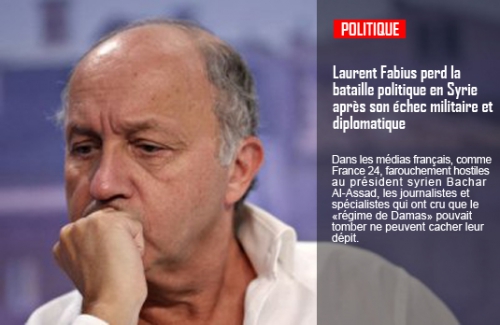
Des Syriens demandent réparation à Fabius!
Source: Le Figaro
Des Syriens, dont des proches ont été victimes de rebelles, ont demandé mercredi au tribunal administratif de Paris une réparation symbolique d’un euro, « pour les fautes personnelles commises par le ministre des Affaires étrangères, Laurent Fabius, dans ses fonctions ». Sept civils syriens, cinq hommes et deux femmes, qui se présentent comme des proches de victimes de violences commises par les rebelles luttant contre le régime de Bachar al-Assad, sont à l’origine de cette procédure.
Laurent Fabius s’est montré en pointe dans le dossier syrien, au côté de la rébellion à qui la France a livré des armes, et il est visé pour plusieurs déclarations publiques. Le chef de la diplomatie avait ainsi estimé, en août 2012, que « Bachar el-Assad ne mériterait pas d’être sur terre » et, en décembre 2012, que »le Front al-Nosra fait du bon boulot », alors même que cette organisation djihadiste syrienne venait d’être classée terroriste par les États-Unis.
L’un des plaignants, Nawar Darwich, affirme que le village près de Lattaquié, dans lequel il s’était réfugié avec sa famille pour fuir des attentats ayant visé son quartier à Damas, avait été envahi à l’aube du 4 août 2013 par des « bandes armées appartenant aux groupes criminels » du groupe al-Nosra et de l’Armée syrienne libre qui ont massacré une quinzaine de membres de sa famille, dont ses parents et quatre de ses frères et sœurs.
Le rapporteur public a demandé le rejet de la demande des plaignants, estimant que la justice administrative était incompétente à l’égard des « actes de gouvernement ».
Le tribunal administratif a mis l’affaire en délibéré sous quinze jours. Les plaignants avaient déjà déposé une plainte contre Laurent Fabius devant la Cour de justice de la République, habilitée à juger les infractions des membres du gouvernement pendant leurs fonctions, mais la justice avait classé la procédure en janvier dernier.
Source: http://www.lefigaro.fr/flash-actu/2014/12/10/97001-20141210FILWWW00263-des-syriens-demandent-reparation-a-fabius.php
00:05 Publié dans Actualité, Affaires européennes | Lien permanent | Commentaires (0) | Tags : politique internationale, syrie, france, europe, affaires européennes, levant, proche orient, méditerranée |  |
|  del.icio.us |
del.icio.us |  |
|  Digg |
Digg | ![]() Facebook
Facebook
Russland setzt auf Währungsallianz mit China
Russland setzt auf Währungsallianz mit China
Ex: http://www.unzensuriert.at

Foto: Federal Reserve / Wikimedia (CC BY-SA 3.0)
Einen weiteren Schritt in Richtung Abschaffung des US-Dollars als Weltwährung haben nun Moskau und Peking gestartet. Am vergangenen Dienstag gab Russland den Startschuss zum Handel sogenannter Yuan-Rubel-Futures. Mit diesen Futures-Kontrakten soll der Markt für das Währungspaar Chinesischer Yuan / Russischer Rubel im internationalen Wirtschaftskreislauf erschlossen werden. Basis ist der sprunghafte Umsatzanstieg des Handels an der Moskauer Börse in der chinesischen Yuan-Währung.
So explodierte der Handel um nicht weniger als 700 Prozent, d.h. auf 395 Milliarden Rubel, die in der chinesischen Währung gehandelt wurden. Und dies ging ausschließlich zu Lasten des US-Dollars. Wobei gleichzeitig der Wechselkurs zwischen US-Dollar und Yuan in den letzten Jahren sehr stabil war. Dies privilegiert den Yuan zusätzlich als eine der neuen Weltwährungen.
Moskau: Währungssicherungselemente werden geschaffen
Laut Andrej Schemetow, dem Chef der Moskauer Börse, ist dies die Basis für die Etablierung einer vollständigen Palette von Yuan-Sicherungselementen beim internationalen Warenverkehr. Damit versucht mach die Spekulationsangriffe von Seiten der USA gegen den Rubel, die seit dem Ausbruch der Ukraine-Krise fortlaufend stattfinden, zu neutralisieren. Handelssanktionen und andere Instrumente des Westens gegen Moskau im Zuge des laufenden Wirtschaftskriegs verlieren so ihre Wirksamkeit.
00:05 Publié dans Actualité, Affaires européennes, Eurasisme, Géopolitique | Lien permanent | Commentaires (0) | Tags : eurasie, géopolitique, devises, yuan, rouble, russie, chine, asie, affaires asiatiques, europe, affaires européennes, politique internationale |  |
|  del.icio.us |
del.icio.us |  |
|  Digg |
Digg | ![]() Facebook
Facebook
samedi, 28 mars 2015
Il faut une «manifestation de solidarité, gauche et droite confondues» contre TTIP et TiSA
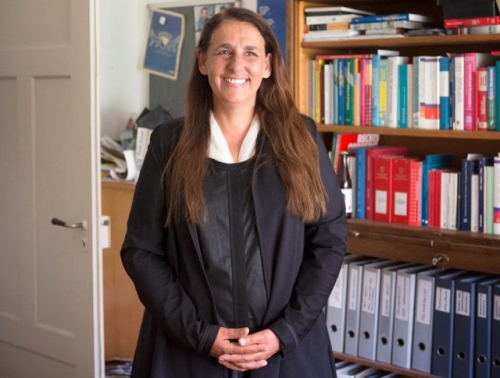
Il faut une «manifestation de solidarité, gauche et droite confondues» contre TTIP et TiSA
Interview de la conseillère nationale Jacqueline Badran, PS/ZH
Ex: http://www.horizons-et-debat.ch
Horizons et débats: TTIP et TiSA sont des accords de libre-échange ayant de lourdes conséquences à long terme. Notre population est mal informée à ce sujet. Que doit-on savoir à propos de ces accords?
Jacqueline Badran: Le TTIP [Partenariat transatlantique de commerce et d’investissement PTCI, ndt.] est un accord de libre-échange entre les Etats-Unis et l’UE, en dehors de l’OMC. TiSA [Accord sur le commerce des services, ndt.] est un accord de libre-échange ne réglant pas les échanges de marchandises, mais les prestations de services au plus large sens du terme. Cela se passe au sein de l’OMC mais non de manière multilatérale du fait que ce ne sont que les membres le souhaitant qui y participent. Cela constitue une différence essentielle.
Pourquoi en sait-on si peu à ce sujet?
Cela vient du fait que les négociations sont tenues secrètes. Dans le cadre du TTIP, c’est la Commission européenne qui le veut ainsi. Néanmoins, un certain nombre d’informations ont filtré. Toutefois, la Commission prétend disposer de vastes compétences lui permettant de mener ce genre de négociations. A la fin, il ne restera que le droit d’accepter ou de refuser cet accord.
Pourquoi en est-il ainsi?
Parce que le Parlement de l’Union européenne n’a pas de droit de proposition. Ce qui se passe au niveau de l’UE est en réalité parfaitement absurde et antidémocratique car ainsi elle s’affaiblit elle-même.
Quels sont les objectifs du TTIP?
Il s’agit en premier lieu de faciliter le libre-échange des biens et surtout d’accorder aux multinationales des droits excessivement étendus.
De quels droits s’agit-il? Quelles compétences veut-on accorder aux multinationales?
Par exemple le droit de déposer plainte en cas de pertes de bénéfices contre un Etat si ce dernier a pris des mesures législatives au détriment de la multinationale. On peut par exemple imaginer un moratoire concernant les OGM, des directives plus strictes dans le domaine de l’environnement ou l’augmentation de la protection des travailleurs. La multinationale peut alors déposer plainte pour pertes de profits. Autrement dit, on met une multinationale privée au même niveau que l’Etat.
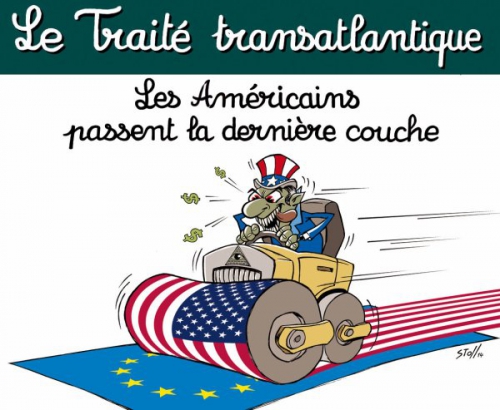
Quelles en sont les conséquences?
On cesse de légiférer. Si, en tant que législateur, on veut entreprendre une action pour mettre fin à un dysfonctionnement, il faudra réfléchir à deux fois quant aux conséquences pécuniaires engendrées car l’Etat sera tenu à l’indemnisation. C’est la fin de la démocratie, car les contraintes imposées ne permettent plus de prendre des décisions démocratiques. C’est le début d’une oligarchie des multinationales, le règne de quelques-uns. Il ne faut pas forcément être un adversaire des multinationales pour refuser cela tout à fait indépendamment du fait que l’on ait des conceptions de gauche ou de droite. C’est un retour à la féodalité, c’est-à-dire à l’époque précédant la révolution bourgeoise. On ne peut pas laisser faire cela.
Qu’y a-t-il derrière cette idée absurde, comme vous l’avez exprimé, que l’économie voire même des Etats entiers, soient transformés en une dictature des multinationales américaines?
Les Etats-Unis ont naturellement une vision impériale et mènent de ce fait une politique d’hégémonie. Au temps de la colonisation les Européens en faisaient de même mais cela fait sans doute partie du passé. Les pays européens ont pratiqué la décolonisation, plutôt mal que bien, mais ils l’ont menée à bout.
Et qu’en est-il des Etats-Unis?
Là, rien n’a changé. Par exemple, la juridiction extraterritoriale y est monnaie courante. On ne se préoccupe pas seulement de ce qui se passe sur son propre territoire, mais aussi ce qui se passe ailleurs. A cela il faut ajouter que les entreprises sont comprises différemment. On a parfois le sentiment qu’aux Etats-Unis l’Etat doit servir les multinationales.
Est-ce différent en Europe?
Oui, chez nous c’est encore différent, même si je dois constater qu’il y a eu relâchement au cours de la dernière décennie. Même chez nous, les multinationales veulent dicter leurs volontés quant aux impôts et aux conditions d’emplacement, sous menace de délocalisation. L’Europe est sur le meilleur chemin de suivre les traces des Etats-Unis.
Dans quels domaines les multinationales peuvent-elles déposer des plaintes?
Elles peuvent déposer plainte contre un Etat pour pertes de profits. L’Etat est soumis à l’obligation d’indemnisation. Si ce qui a filtré est vrai, alors les multinationales ont le droit d’action pénale et désignent elles-mêmes les juges. Il y aurait un tribunal arbitral composé d’avocats privés. Ce sont des juges qui ne sont ni élus ni légitimés. Les multinationales peuvent donc déposer plainte et parallèlement désigner les juges compétents. C’est incroyable. Qui peut bien inventer une chose pareille? C’est la fin de la démocratie, de l’Etat de droit et le début du règne des multinationales remplaçant les princes d’antan. Cela est totalement antidémocratique et extrêmement douteux par rapport à l’Etat de droit.
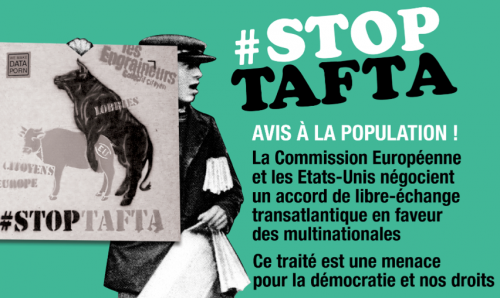
Ici se pose aussi la question des «juges étrangers». Quel est votre point de vue?
Quand la droite parle de «juges étrangers» dans l’UE, il s’agit au moins de juges élus démocratiquement. Il s’agirait donc d’un processus que nous déciderions volontairement de façon bilatérale. Ceux qu’on peut par contre qualifier de «juges étrangers», ce sont les juges désignés par la partie plaignante. On atteint un sommet d’absurdité. Pour notre démocratie directe ce serait la fin de même que pour l’Etat de droit. Cela m’est impensable.
Comment réagissent les pays de l’UE à cette affaire?
En Allemagne, même les socialistes estiment que ce serait un bienfait pour le commerce d’exportation allemand. On calcule en pourcents de PIB supposés, au lieu de dire clairement: c’est inacceptable. Où est-ce que cela va aboutir? Le libre-échange en soi peut être une bonne chose, mais certainement pas à ce prix.
Il faudrait donc s’attendre à un grand débat dans les pays de l’UE?
Oui, mais cela tourne autour de la question de certaines lignes rouges qu’il faut déplacer: à savoir s’il est préférable de ne pas avoir de tribunal arbitral, mais tout de même les droits d’action, etc.
De quels droits d’action s’agit-il?
Ce sont des droits d’action concernant les investissements («investment dispute settlement»). Il s’agirait de «garantir les investissements». Mais en réalité, on investit rien. Ce qu’on veut, c’est vendre des poulets au chlore ou du maïs OGM. Cela n’a rien à voir avec des investissements classiques. Ce sont des réglementations comme celles imposées dans les pays en développement et les dictatures, dans le but de se prémunir contre des expropriations. On voulait éviter ainsi qu’une fabrique nouvellement construite puisse être nationalisée. On reprend ce procédé et on l’adopte à nos pays occidentaux civilisés, qui connaissent le droit et la démocratie et maîtrisent plus ou moins la corruption.
Pourquoi se met-on à négocier de tels accords?
A vrai dire, il est presque impensable que la Commission européenne se mette à négocier une chose pareille. Toutefois, cette même Commission a même proposé de privatiser l’eau, ce qui était tout aussi incompréhensible et inacceptable. Le pouvoir central de l’UE est libertaire à tel point que rien ne va plus, indépendamment du domaine. Il n’arrête pas de privatiser et libéraliser depuis des années. Tout doit être soumis à la logique de l’optimisation du capital. C’est mettre l’économie au-dessus de la politique. En réalité, c’est déjà le cas aujourd’hui, maintenant il s’agit de le consolider au niveau institutionnel.
Si la Suisse devait, à l’avenir, s’y associer, que cela signifierait-il pour le pays?
Il est évident que pour nous en Suisse cela reviendrait à enterrer de facto notre démocratie directe. Car avec chaque décision que nous voudrions prendre, nous devrions prendre en compte que nous sommes soumis à l’obligation d’indemnisation.
L’agriculture est également objet de négociations. Que cela signifierait-il?
Certes, nous avons une agriculture de haute qualité. Et cela nous coûte d’avoir d’autres processus de production et d’autres normes que l’UE. Déjà avec le principe du «Cassis de Dijon», le principe de l’équivalence, nous demandons à juste titre des «produits similaires». Nous exigeons que non seulement les produits soient similaires, mais aussi le processus de production. Donc, si nous laissons vivre de façon naturelle nos poules en leur accordant le plus possible de liberté de mouvement, mais que, par ailleurs, il y a les poules en batteries de l’UE, alors ce ne sont pas les mêmes poules. Nous sommes avec raison fiers de notre agriculture qui a de hautes normes de protection des animaux et de l’environnement. Avec ces accords, tout cela serait éliminé. Tout ce que nous avons décidé démocratiquement n’aurait plus aucune valeur. Voilà ce que nous devons empêcher.
Revenons-en à TiSA. A quoi doit s’attendre la Suisse?
Là, il s’agit de tout le domaine des services publics, tels les écoles, les hôpitaux, l’approvisionnement en eau, les infrastructures etc. qui sont à juste titre soumis chez nous à des règles bien précises. C’est une remise en question de notre service public.
Quelles en seraient les conséquences?
Si les fuites récentes disent la vérité – alors même que le Conseil fédéral prétend que les écoles et la santé ne seraient pas touchés –, il faudrait accorder à un prestataire privé, en l’occurrence une école privée, les mêmes subventions que celles dues à l’école publique.
Peut-on dans ce cas avoir confiance en le Conseil fédéral?
Je ne le crois pas. Quand le Conseil fédéral prétend qu’on ne touchera pas aux écoles, c’est de la tactique, du fait qu’il n’y aurait pour l’instant pas de succès. On attend donc 10 années pour mettre la population au pas et alors les lobbies exerceront une pression considérable. Par exemple de la part du groupe Hirslanden qui exerce actuellement déjà d’énormes pressions dans notre pays. En réalité, il s’agit d’une firme immobilière et rien de plus. La pression sera forte avec le slogan: «Le privé est bon, l’étatique est mauvais». Cela va totalement à l’encontre des fondements de notre Etat.

Le service public serait donc atteint de plein fouet.
Oui, notre service public en entier qui forme le socle de notre modèle à succès. Dans notre pays, personne ne doit réaliser des bénéfices pour des biens fondamentaux dont nous avons besoin. Le bénéfice d’une institution revient à 100% à la population qui est également propriétaire, et non pas à un petit nombre de personnes. Ce n’est pas par hasard que l’eau, l’électricité, la santé, l’enseignement, les transports en commun, la sécurité et même les services bancaires font partie du bien public. Cela ne se trouve dans aucun autre pays du monde. Ces biens fondamentaux sont soumis depuis plusieurs siècles au principe du bien public et cela depuis la bataille de Morgarten (1315). Ce principe fondamental est un élément constitutif de la Suisse et de sa démocratie directe. C’est étroitement lié ensemble. TiSA permet de privatiser tout ce qui est d’intérêt général et de renchérir les services puisque les propriétaires privés exigent des bénéfices également sur tous les biens indispensables.
… et cela concernerait des domaines aussi sensibles que la santé et la formation …
Oui. Pourquoi devrai-je procurer un bénéfice à un hôpital du seul fait d’y avoir été traité? Pourquoi accorder un bénéfice pour la formation? Il n’y a aucune raison. C’est l’Etat qui prend cela en charge. C’est un de nos avantages essentiels, c’est un facteur de succès primordial de la Suisse. Regardons l’Angleterre où il faut débourser de grosses sommes pour une bonne école privée. Il en va de même aux Etats-Unis, en France et de plus en plus aussi en Allemagne. Là, nous sommes uniques en Suisse. Cette exclusivité est un aspect central de l’essence de notre pays, personne n’a le droit d’y toucher. Le modèle à succès que représente la Suisse réside dans son excellent service public pour lequel personne ne doit réaliser de bénéfices pour les biens de première nécessité. L’objectif à poursuivre est de pérenniser cette situation.
En résumé, on peut dire que ces deux accords interviennent profondément dans le système étatique suisse en réduisant considérablement l’indépendance du pays.
Ce serait la mort de notre indépendance. Cela est vrai pour tout Etat qui y participerait. Non – en réalité ce serait un suicide, consenti volontairement.
Que faire?
Moi, je serais très heureuse d’assister à une manifestation de solidarité gauche et droite confondues, car les conséquences seraient probablement encore pires qu’une adhésion à l’UE. Le PLR et économiesuisse prétendent déjà que nous en avons besoin, par exemple à cause du franc fort. Là, on abuse de la levée du taux plancher pour ses besoins politiques. Pour économiesuisse le libre-échange représente aujourd’hui encore la seule vérité. Ce qui manque, c’est toute considération critique en faveur d’un libre-échange sensé. Nous devons arriver à stopper ce développement allant à l’encontre de notre démocratie et de notre système étatique suisse.
Madame la Conseillère nationale, nous vous remercions pour cet entretien. •
(Interview réalisée par Thomas Kaiser)
00:10 Publié dans Actualité, Affaires européennes, Entretiens, Géopolitique | Lien permanent | Commentaires (0) | Tags : géopolitique, politique internationale, traité transatlantique, europe, affaires européennes, union européenne, entretien |  |
|  del.icio.us |
del.icio.us |  |
|  Digg |
Digg | ![]() Facebook
Facebook
Révélations sur les profonds liens financiers entre la Fondation Clinton et les oligarques ukrainiens
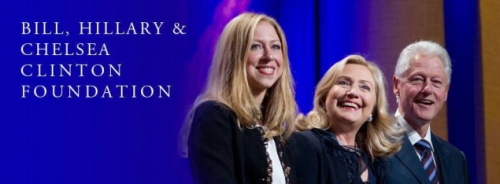
Révélations sur les profonds liens financiers entre la Fondation Clinton et les oligarques ukrainiens
Incroyables Révélations sur les racines du problème Ukrainien ! Et ça, vous ne le lirez pas dans les médias mainstreams , qui le qualifieront sûrement de « théorie du complot » n’est ce pas, même si c’est donné (en partie) par le Wall Street Journal : demandez vous POURQUOI ! Ce n’est pas sérieux, les médias de masse ne sont plus crédibles : notre force et ce qui fait toute la différence (et elle est de taille), c’est que nous on ne travaille pour aucun intérêt privé, on ne recherche que la Vérité, en ces temps de tromperie universelle…
Révélations sur les profonds liens financiers entre la Fondation Clinton et les oligarques ukrainiens qui ont poussé à resserrer les liens avec l’Union Européenne.
Entre 2009 et 2013, y compris quand Mme Clinton était Secrétaire d’État, la Fondation Clinton a reçu au moins 8,6 millions de dollars de la fondation Victor Pinchuk, selon cette même fondation, basée à Kiev. Elle a été créée par M. Pinchuk dont la fortune provient d’une entreprise de fabrication de tuyaux. Il a effectué deux mandats comme membre élu du parlement ukrainien et est un partisan de liens plus étroits entre l’Ukraine et l’Union Européenne.
En 2008, M. Pinchuk a signé un engagement de 29 millions de dollars sur 5 ans à la Clinton Global Initiative, une aile de la fondation qui coordonne les projets caritatifs et les financements mais qui ne gère pas l’argent. L’engagement portait sur le financement d’un programme de formation des futurs dirigeants ukrainiens et de professionnels « pour moderniser l’Ukraine”, selon la Fondation Clinton. Plusieurs anciens sont les membres actuels du Parlement ukrainien. Les dons réellement versés jusqu’à présent s’élèvent à seulement 1,8 millions de dollars, selon un porte-parole de la Fondation Pinchuk, citant l’impact de la crise financière de 2008.
La Fondation Pinchuk a déclaré que ses dons étaient destinés à contribuer à ce que l’Ukraine devienne “un pays prospère, libre, moderne et basé sur les valeurs européennes”. Elle a déclaré que si M. Pinchuk faisait du lobbying au département d’Etat concernant l’Ukraine, “cela ne pourrait être considéré autrement que comme une bonne chose”. – extrait de l’article du Wall Street Journal : Clinton Charity Tapped Foreign Friends
La première fois que j’ai lu le titre de cet article, j’en ai fait peu de cas. En fait, j’ai presque failli l’ignorer pensant que c’était juste la copie d’un paragraphe précédent que j’avais souligné dans le journal : Hillary Clinton mise à nue partie 2 – la Fondation Clinton a reçu des millions de pays qui financent aussi ISIS.
Heureusement, j’ai décidé de jeter un coup d’oeil et ma mâchoire en est tombée. Bien que le Wall Street Journal n’ait pas insisté sur le lien, j’ai été stupéfait de voir que, de tous les oligarques liés à des gouvernements étrangers qui ont fait don à la Fondation Clinton alors qu’Hillary était Secrétaire d’État, l’Ukraine était en tête de liste.
J’ai trouvé cela étrange mais en poursuivant ma lecture j’ai eu peine à croire à quel point le contributeur principal était lié à l’actuel régime au pouvoir. Considérant qu’il s’agit aujourd’hui du point géopolitique le plus chaud sur la planète, beaucoup, beaucoup de questions restent à être posées.

Rappelons également certains des aspects les plus louches du nouveau gouvernement ukrainien en regardant un peu en arrière sur l’article Made in USA – comment le gouvernement ukrainien distribue la citoyenneté afin que des étrangers puissent diriger le pays. En voici quelques extraits :
Des allégations selon lesquelles le nouveau gouvernement en Ukraine et son parlement ne sont rien de plus que des marionnettes occidentales ont constamment circulé depuis le mois de février. Néanmoins, je pense qu’il est très important que la prise de contrôle soit désormais manifeste, indéniable et complètement déclarée. Rien ne prouve ce fait plus clairement que le récent et soudain octroi de la citoyenneté à trois étrangers afin qu’ils puissent occuper des postes de haut niveau au sein du gouvernement.
En haut de la liste est l’américaine Natalie Jaresko qui dirige le fond de capital-investissement Capital Horizon. Elle sera désormais le ministre des finances de l’Ukraine, et je doute fort qu’elle doive payer la taxe d’expatriation sur le revenu (un ensemble de lois pour les riches et puissants, une autre série de lois pour les paysans). Pour le Ministère de l’économie, c’est un banquier d’affaires lituanien, Aivaras Abromavicius, qui prendra les rênes. Le Ministre de la santé sera Alexander Kvitashvili de Géorgie.
Maintenant lisez l’extrait du WSJ qui suit :
La Fondation Clinton a renoncé aux dons de gouvernements étrangers lorsque Hillary Clinton était Secrétaire d’État. Un examen de ses déclarations montre que cela n’a pas empêché la Fondation de lever des millions de dollars d’étrangers ayant des liens avec leurs gouvernements d’origine.
Certains donateurs ont des liens directs avec des gouvernements étrangers. L’un est membre de la famille royale saoudienne. Un autre est un oligarque ukrainien et ancien parlementaire. D’autres sont des personnes ayant des liens étroits avec des gouvernements étrangers qui découlent de leurs activités commerciales privées. Leurs politiques d’intérêts déclarées varient des droits de l’homme jusqu’aux relations États-Unis-Cuba.
Tout compte fait, d’après les documents de la fondation, il y a eu plus d’une douzaine d’étrangers, fondations et entreprises grands donateurs de la Fondation Clinton dans les années suivant la période de 2009 où Mme Clinton était secrétariat d’État, donnant collectivement entre 34 et 68 millions de dollars. Certains donateurs ont également fourni un financement direct à des projets de bienfaisance parrainés par la Fondation, évalué par l’organisme à 60 millions de dollars.
Les bailleurs de fonds étrangers joints par le Wall Street Journal ont déclaré qu’ils ont contribué à la Fondation pour des raisons de bienfaisance, et non pour des raisons politiques.
L’ancien Président Bill Clinton a promis à l’administration Obama que la Fondation n’accepterait pas de dons de gouvernements étrangers tant que son épouse est Secrétaire d’État. L’accord n’impose pas de limites sur les dons de particuliers étrangers ou de sociétés.
Pendant l’activité de Mme Clinton au département d’Etat, M. Schoen, sondeur, était enregistré comme lobbyiste pour M. Pinchuk d’après des documents fédéraux. M. Schoen a déclaré avoir rencontré plusieurs fois, avec M. Pinchuk, les aides Clinton y compris Melanne Verveer, une ukrainiene-américaine, ainsi qu’un ambassadeur itinérant du département d’Etat pour les questions autour de la place des femmes dans le monde. Le but, d’après M. Schoen, était d’encourager les Etats-Unis à faire pression sur le président ukrainien Viktor Yanukovych afin qu’il libère son prédécesseur alors emprisonné, Yulia Tymoshenko.
M. Schoen a ajouté que son lobbying était sans rapport avec les dons. “Nous ne tentions pas d’utiliser n’importe quel effet de levier ou toute connexion ou quelque chose du genre en relation avec la Fondation”, a-t-il dit.
S’il te plaît Schoen, ne me pisse pas sur la jambe en me disant qu’il pleut.
La Fondation Pinchuk a déclaré que ses dons étaient destinés à contribuer à ce que l’Ukraine devienne “un pays prospère, libre, moderne et basé sur les valeurs européennes”. Elle a déclaré que si M. Pinchuk faisait du lobbying au département d’Etat concernant l’Ukraine, “cela ne pourrait être considéré autrement que comme une bonne chose”.
Oui, bien sur, il suffit de jeter un bref coup d’oeil sur l’Ukraine pour constater à quel point ce fut une chose merveilleuse pour le pays.
Le Royaume d’Arabie Saoudite n’était pas autorisé à donner à la Fondation tant que Mme Clinton était au département d’Etat. Mais plusieurs hommes d’affaires saoudiens de premier plan ont donné des millions.
Victor Dahdaleh, un homme d’affaires de Londres dont la Fondation a contribué entre 1 et 5 millions de dollars, a des liens avec une société d’aluminium appartenant à l’état de Bahreïn. Il a été l’intermédiaire entre l’entreprise d’Etat Aluminium Bahrain B.S.C. et Alcoa World Alumina, qui est majoritairement détenue par Alcoa Inc. L’an dernier, il a été acquitté à Londres sous l’inculpation de corruption de fonctionnaires Bahreïnis afin d’obtenir des contrats pour la société Alcoa. L’an dernier aux États-Unis, la filiale d’Alcoa a plaidé coupable à des accusations de corruption, et le Ministère de la Justice a déclaré qu’une enquête sur la question reste ouverte.
Rilin Enterprises, filiale d’une société chinoise privée de construction, d’infrastructure et de société de gestion de port, a donné un gage de 2 millions de dollars à la Fondation. La société a été fondée et est dirigée par Wang Wenliang, membre du Congrès National du Peuple, l’ancien organe parlementaire de la Chine. M. Wang n’a pas répondu à notre demande pour un entretien au cours de la réunion annuelle plus tôt ce mois.
M. Wang est l’ancien fonctionnaire municipal de Dandong, une ville de 2,4 millions d’habitants dans la province de Liaoning, sur la frontière entre la Chine et la Corée du Nord. Sa société contrôle désormais le port de cette ville, une route commerciale importante en Corée du Nord.
La Fondation Clinton ignorait que M. Wang était un délégué à l’APN (NPC), selon un responsable de la Fondation.
Une des sociétés de M. Wang était un entrepreneur pour la nouvelle ambassade de Chine à Washington.
Dans une économie d’oligarques truquée et frauduleuse, c’est ce que nous appelons un gentil “retour de copinage”.
Eh bien, oui. C’est pourquoi les Etats-Unis sont « la meilleure “Democracie” que l’argent peut vous offrir : pour chaque dollar dépensé influençant la politique américaine, les sociétés obtiennent $760 en retour”.
Au pire, ce qui précède aide aussi à expliquer ce qui suit : la farce est totale : le fils de Joe Biden rejoint le conseil d’administration du plus grand producteur de gaz d’Ukraine.
- Source : Michael Krieger
00:05 Publié dans Actualité, Affaires européennes | Lien permanent | Commentaires (0) | Tags : ukraine, actualité, politique internationale, europe, affaires européennes, fondation clinton, ong américaines |  |
|  del.icio.us |
del.icio.us |  |
|  Digg |
Digg | ![]() Facebook
Facebook
vendredi, 27 mars 2015
De pyrrhusoverwinning van SYRIZA

De pyrrhusoverwinning van SYRIZA
Ex: http://www.solidarisme.be
“Als we nog één veldslag winnen, gaan we (eraan) ten onder!” Dat antwoordde de Griekse koning Pyrrhus in 279 v. Chr. na een zoveelste moeizame overwinning op de Romeinen. Vandaag ziet het ernaar uit dat Alexis Tsipras, de nieuwe Griekse premier, goed op weg is een nieuwe betekenis te geven aan het begrip dat sindsdien bekend staat als “pyrrhusoverwinning”.
De verkiezingsoverwinning van Tsipras lijkt wel de kroniek van een aangekondigde dood. Herinnert u zich nog dat hij eind januari met veel bombarie de samenwerking met de gehate Trojka (Europese Commissie, Europese Centrale Bank en Internationaal Monetair Fonds) opgezegde? Wel, amper een maand later, op 20 februari, had zijn minister van Financiën al een akkoord met diezelfde Trojka bereikt. Met andere woorden, de samenwerking is al hervat nog voor ze goed en wel was opgezegd. “We hebben een veldslag gewonnen, maar nog niet de oorlog”, zei Tsipras, van wie niet kan worden gezegd dat hij ook de eerlijkheid van Pyrrhus heeft. Als een verlenging van het bestaande(!) noodpakket al een gewonnen veldslag wordt genoemd, is het duidelijk dat Tsipras’ “oorlog” erin alleen in bestaat om Griekenland koste wat kost in de eurozone te houden.
Minister van Financiën Yanis Varoufakis noemde het akkoord dat hij had bereikt met de Trojka (in de hoedanigheid van de Eurogroep) “een kleine stap in de juiste richting”. Waaruit die (mars)richting dan wel bestaat? Toch niet de verkiezingsbeloften van het uiterst-linkse SYRIZA, waarvoor Tsipras en hijzelf verkozen zijn? De enige overwinning die ze op hun conto kunnen schrijven, bestaat erin dat de voorwaarden van het (bestaande) noodpakket versoepeld zijn en de Grieken een “alternatief” besparingsplan mogen opstellen. Daarmee vervallen onder meer de verplichting van de Trojka om de lonen en pensioenen te verlagen (maar dat betekent nog geen verhoging!) alsook die om de btw op voeding en geneesmiddelen te verhogen (maar dat betekent nog geen verlaging!). Met andere woorden: het was al slecht en het zal even slecht blijven. Er verandert gewoon niets. Het status-quo wordt verlengd. Griekenland blijft aan het kredietinfuus liggen en zal dat krediet met rente en sociale rampen dubbel en dik moeten terugbetalen.
Wel veranderd zijn de woorden “Trojka”, “memorandum” en “crediteurs”, die in de tekst van de Eurogroep werden geschrapt en vervangen door “instellingen”, “akkoord” en “partners”. Zo luidt het in de open brief van een ontgoochelde Manolis Glezos, Europees parlementslid voor Syriza en verzetsheld uit de Tweede Wereldoorlog (cf. “SYRIZA Begins to Crack: ‘Legendary’ SYRIZA MEP Apologises to the Greek People for Their Deception”, XA Ameriki, 23 februari 2015). De hele maskerade, een typisch staaltje van politiek-correcte taalmanipulatie, kan echter niet verhullen dat alvast een heleboel verkiezingsbeloften van Syriza niet ingelost zullen worden. Zo zal het minimumloon niet worden verhoogd tot 751 euro en evenmin de privatiseringsgolf van de vorige regering teruggedraaid. Zelfs nieuwe privatiseringen worden helemaal niet uitgesloten, hooguit zullen ze voortaan aan een uitvoerige beoordeling onderworpen worden. Dat was tot nog toe niet het geval in het door corruptie geplaagde Griekenland. Griekenland blijft dus een land onder Europese curatele, waar inspecteurs van de Trojka, excuseer, “instellingen” de besparingen zullen superviseren. Een land dat van zijn nationale soevereiniteit enkel nog de soevereine schuld overhoudt.
Het probleem met verkiezingen in Griekenland of elders is natuurlijk dat kiezers zich steeds weer blindstaren op beloftes van de burgerlijke partijen (die niet het volk als geheel, maar fracties van de burgerij vertegenwoordigen). Ze hebben meestal niet het flauwste benul van hoe die beloftes verwezenlijkt moeten worden. De verkiezingen zijn zelf ook een maskerade, omdat ze de illusie voeden dat de sociale hiërarchie zichzelf periodiek even opheft, kan worden geteld en opnieuw uitgevonden. Daar is natuurlijk niets van aan. SYRIZA is niet alleen op vlak van kiezersbedrog in hetzelfde bedje ziek als de andere partijen, maar ook dwaas als het oprecht geloofde dat verkiezingen genoeg zijn om een verandering van de machtsverhoudingen te bewerkstelligen. De sociale hiërarchie blijft immers wat ze is: een hiërarchie van geldgevers en geldnemers, schuldeisers en schuldenaars. Hét kiezersbedrog dat in de sterren geschreven stond, was natuurlijk de onmogelijke belofte van SYRIZA om Griekenland in de Eurozone te houden en tegelijk het door diezelfde Eurozone opgelegde besparingsbeleid af te wijzen. Gezien de trotskistische, internationalistische en eurocommunistische achtergronden van die partij hoeft dat niet te verbazen. Zo hielden Tsipras en ECB-voorzitter Mario Draghi in juni vorig jaar al topoverleg als “internationalisten” onder elkaar. Een andere ogenschijnlijke eigenaardigheid is dat Syriza banden zou hebben met het Institute for New Economic Thinking (INET) van George Soros, de superspeculant van joodse komaf die al langer protestbewegingen financiert in Oost- en nu dus ook Zuid-Europa (cf. “Wie sich George Soros als Euro-Retter inszeniert”, Wirtschaftswoche, 14 februari 2013).
Het moge duidelijk zijn dat SYRIZA zonder stappenplan aan zijn “revolutie” begonnen is. De eerste stap die de partij zou moeten zetten is natuurlijk uit de Eurozone treden en naar de drachme terugkeren. Die laatste kan dan tegen een voordelige wisselkoers (of zelfs meervoudige wisselkoers) de uitvoer aanzwengelen om de handelsbalans te versterken. De eerste stap naar een sociale revolutie is dus een nationale revolutie door een herbevestiging van de staat in zijn hoedanigheid van uitvoerende macht. De publieke opinie in de EU-landen, zelfs in Griekenland, is de afgelopen jaren echter zodanig bang gemaakt voor de mogelijke gevolgen van een euro-exit dat ze blind is geworden voor de rampzalige werkelijkheid van de euro in Griekenland zelf. Natuurlijk is uit Eurozone treden alleen niet genoeg, maar het is wel de eerste stap. Wie het geldwezen – en dus ook de kapitaalvorming en het kapitaalverkeer – op een andere leest wil schoeien kan dat immers niet doen zonder een eigen betaalmiddel en een eigen, liefst genationaliseerde nationale bank.
00:05 Publié dans Actualité, Affaires européennes | Lien permanent | Commentaires (0) | Tags : actualité, europe, affaires européennes, politique internationale, syriza, grèce, méditerranée, balkans |  |
|  del.icio.us |
del.icio.us |  |
|  Digg |
Digg | ![]() Facebook
Facebook
Naturalisation : non au « droit du sol » !
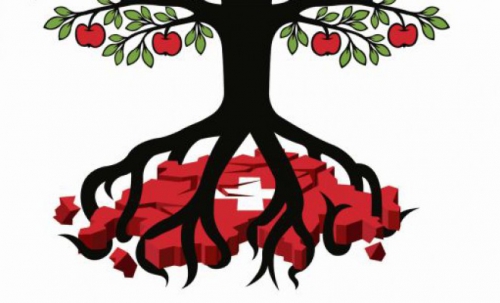
Naturalisation: non au «droit du sol»!
Donnant suite à l’initiative de la socialiste Ada Marra, le Conseil national vient d’accepter une modification fondamentale de notre droit de la naturalisation.
Actuellement, la Constitution fédérale prévoit (art. 38) :
La Confédération règle l’acquisition de la nationalité et des droits de cité par filiation, par mariage ou par adoption.(…)
Le Conseil national propose la modification suivante :
La Confédération règle l’acquisition de la nationalité et des droits de cité par filiation, par mariage, par adoption ou par naissance en Suisse. (…)
En termes clairs, c’est l’introduction du « droit du sol » dans un pays qui ne connaît que le « droit du sang ».
Nos conseillers nationaux (de gauche comme de droite) ont beau tenter toutes les périphrases qu’ils veulent pour cacher cette réalité simple : ils proposent au peuple l’adoption du droit du sol. Il faudra que le peuple suisse dise NON.
On commencera par se demander quel mobile pousse des élus raisonnables à créer un problème là où il n’y en a pas. Je ne parle pas des socialistes, aveuglés par leur obsession de l’égalité, qui ne supportent pas les « discriminations » entre Suisses et étrangers. Mais des gens raisonnables, ces nombreux PLR et PDC qui ont soutenu ce texte.
La Suisse est un modèle reconnu dans le monde entier pour sa politique d’intégration. La naturalisation est accordée à des étrangers qui peuvent démontrer leur bonne intégration dans notre pays et leur volonté d’en devenir des citoyens à part entière : et cette pratique fait partie d’une politique d’intégration réussie. Rien, mais vraiment rien ne justifie que cette pratique soit abandonnée, au profit d’une naturalisation accordée au seul motif d’être né en Suisse. La France connaît le droit du sol : c’est un échec absolu, permettant le développement de vastes communautés totalement refermées sur elles-mêmes, mais qui pourtant disposent de tous les droits accordés aux Français.
Le problème, disent ces gens raisonnables, ce sont les étrangers de la troisième génération. Soit. Mais de deux choses l’une : ou bien ce sont des « Suisses » bien intégrés : il leur suffit de démontrer leur intégration, ce qui est chose facile, et ils obtiennent le sésame à croix blanche, car la nationalité est déjà facile pour tous les étrangers nés en Suisse. Ou bien ils ont été élevés par des parents (la deuxième génération) qui n’ont pas voulu faire la démarche (facilitée) de la naturalisation et ont élevé leurs enfants soit dans le mépris de la nationalité suisse, soit, pire encore, dans la haine à son égard. Et c’est à eux qu’ont offrirait un « droit du sol » !
Les observateurs voient bien que le peuple risque de ne pas emboiter le pas du Conseil national. Tant mieux. Changer fondamentalement la règle d’un système qui fonctionne pour le rapprocher des systèmes qui échouent, c’est une coquetterie d’élus désœuvrés. Le peuple suisse n’est pas désœuvré et il a mieux à faire !
Jacques-André Haury, 13 mars 2015
00:05 Publié dans Actualité, Affaires européennes | Lien permanent | Commentaires (0) | Tags : droit du sang, suisse, droit, nationalité, europe, affaires européennes |  |
|  del.icio.us |
del.icio.us |  |
|  Digg |
Digg | ![]() Facebook
Facebook
jeudi, 26 mars 2015
Au-delà de Bruxelles, un État européen souverain!
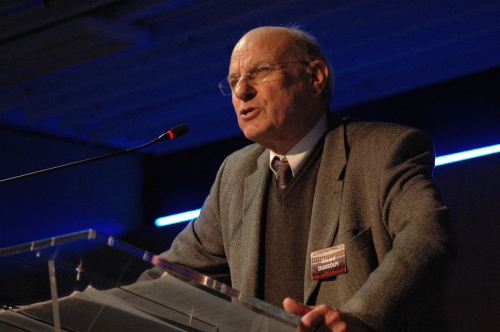
Au-delà de Bruxelles, un État européen souverain!
par Georges FELTIN-TRACOL
C’est devenu une banalité d’affirmer que l’Union européenne va mal. La crise de sa monnaie unique, la mise en tutelle d’États membres, la multiplication de nouveaux traités supposés améliorer les précédents, leur ratification rapide hors de tout débat public, la généralisation de normes qui, comme dans l’hôtellerie, assassine les hôtels familiaux au profit de grandes chaînes hôtelières, l’ouverture imminente de négociations avec les États-Unis afin de constituer une aire transatlantique de libre-échange occidentale ruineuse pour les ultimes secteurs compétitifs européens, etc., renforcent chaque jour un peu plus la défiance légitime de populations désenchantées par une construction administrative qui aboutit au cauchemar.
Montrant par leur inaction coupable un comportement de nabots, les européistes officiels sont comme tétanisés par la montée en puissance dans les opinions publiques d’un très vigoureux sentiment eurosceptique quand il n’est pas carrément anti-européen. L’actuel projet européen court à son échec final. Faut-il s’en féliciter ? Certainement pas assure Gérard Dussouy, professeur émérite à l’Université de Bordeaux qui a consacré une grande partie de ses cours à traiter des relations internationales et de la géopolitique. À l’encontre de la tendance dominante, le professeur Dussouy s’oppose à la fois aux souverainistes nationaux et aux européistes officiels, car il propose que les peuples et les États d’Europe fassent un « saut décisif » et cofondent une République européenne souveraine.
Comme d’autres auteurs avant lui, Gérard Dussouy part du constat que le monde européen doit relever plusieurs défis vitaux. Il perçoit une « convergence des crises en Europe (p. 25) » et pense, contrairement aux optimistes béats qui estiment la crise de l’euro derrière nous, que « les prochaines décennies vont voir les crises s’accumuler; une crise pouvant cacher une autre (p. 25) ». Leur succession rapide risque de tuer l’Europe comme idée civilisationnelle.
Pour le professeur Dussouy, la plus inquiétante demeure l’effondrement démographique. « Avec le taux de natalité actuel, en 2050, l’Union européenne comptera entre 401 millions d’habitants et 470 millions (p. 27) ». Cette population sera généralement âgée du fait du vieillissement constaté. Or ce phénomène « sclérose l’économie du continent, et […] amoindrit l’esprit de défense des Européens (p. 26) ». Le Système veut compenser cette pénurie humaine par un « recours toujours plus grand à l’immigration extra-européenne [qui] apparaît alors comme la solution de facilité pour compenser la déflation démographique. Mais elle entraîne une forte hétérogénéisation des populations et une décohésion des peuples européens par l’inclusion inévitable de diasporas multiples qui finissent par constituer des communautés territorialisées (p. 26) ». Il en résulte une nette paupérisation des États européens et accélère leur instabilité intérieure.
Par ailleurs, la désindustrialisation va se poursuivre. Quant au risque de banqueroute des États du Vieux Continent, son déclenchement provoquera à coup sûr une crise politique et sociétale de grande ampleur dont l’aboutissement logique serait une « nouvelle Guerre de Trente Ans » (expression de l’universitaire suisse Bernard Wicht). Ce bouleversement majeur signifierait la fin de l’exception historique européenne et donc son exclusion définitive. Déjà en raison du « renversement du monde » (Hervé Juvin), notre continent se retrouve en périphérie d’un nouveau monde dont le « centre de gravité […] [est] le Grand Océan, c’est-à-dire l’espace maritime formé par la réunion de l’océan Pacifique et de l’océan Indien (p. 63) ». En cours de marginalisation géographique, l’Union européenne peut rater, suite à de petits calculs politiciens, sa mutation tandis que s’affirment dans le même temps les États-continents. Or de tels ensembles sont les seuls capables d’encadrer une mondialisation déchaînée. L’auteur constate que « la marge de manœuvre de la politique économique de l’État-continent est d’autant plus grande qu’il dispose de grandes réserves de main d’œuvre, de personnels qualifiés, et d’un vaste marché intérieur. Il peut, selon le contexte, changer de politique commerciale (p. 65) ».
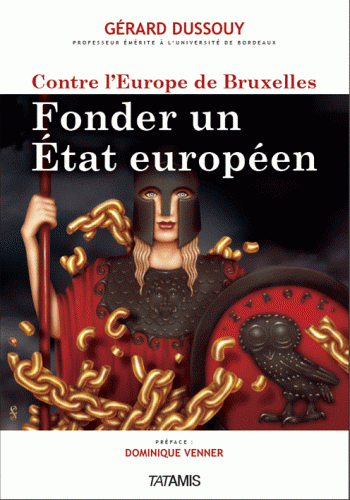
Un « duopole américano-asiatique (p. 68) » est en train de se mettre en place, ce qui marque la fin de l’hégémonie unipolaire des États-Unis qui conservent néanmoins toute leur puissance militaro-technologique. L’auteur ne le mentionne pas, mais le déclin de l’attractivité européenne pourrait à terme les inviter à retirer leur « parapluie » militaire et nucléaire qui protègent pour l’heure leurs vassaux colonisés. Ceux-ci se retrouveraient alors désarmés face à de terribles menaces dont un islamisme à visée mondialiste et une submersion migratoire africaine.
Dans ces conditions – Gérard Dussouy évoque aussi la crise climatique génératrice de tensions probables et le spectre de la pénurie des ressources naturelles énergétiques (on suppose qu’il ignore les travaux des décroissantistes en faveur d’une révolution économique et sociale à rebours du mythe mortifère de la croissance) -, « les Européens, s’ils entendent être partie prenante au jeu multipolaire qui s’organise entre les États-Unis et les puissances asiatiques, n’ont d’autre choix que de se réunir dans un État continental (p. 94) ».
Cet État européen doit impérativement se donner des frontières précises qui nient enfin l’intention mondialiste – cosmopolite de certains chantres d’une construction européenne bâclée, néfaste et « économicocentrique ». Gérard Dussouy pense que la Turquie n’est pas destinée à rejoindre le concert européen. Ce cas réglé, « le problème des frontières de l’Europe est immédiatement résolu par la géographie. Car ses frontières sont naturelles : à l’Ouest, l’océan Atlantique; au Nord, l’océan Arctique; au Sud, la Méditerranée, la mer Noire et le Caucase. À l’Est, potentiellement l’océan Pacifique, bien que beaucoup d’Européens voient l’Europe s’arrêter à la frontière de la Russie (p. 113) ». L’auteur n’adhère pas à ce dernier point de vue. Il ne rejoint pas non plus la thèse pour laquelle la Russie serait une civilisation spécifique, eurasienne. Pour lui, « l’option eurasiste (la Russie comprise comme un entre-deux mondes et autarcique) est un leurre, destiné à faire réfléchir les Européens. Car, agrémentée d’une alliance avec le monde musulman, elle semble très hypothétique et particulièrement aventureuse (p. 116) ».
Considérant plutôt qu’il y a « une complémentarité géo-économique totale (p. 118) », Gérard Dussouy envisage « une alliance, puis une union, entre l’Union européenne et la Russie, […] vitales, à toutes les deux, pour peser ensemble sur la répartition des forces mondiales (p. 117) ». Mais cela suppose en amont l’existence d’un État européen viable, cohérent et puissant.
« Il n’existera jamais “ une Europe ”, puissance internationale garante de la survie des nations culturelles qu’elle englobe, tant que n’existera pas un État européen (p. 137). » L’auteur réclame une « révolution supranationale fédéraliste » afin de susciter une souveraineté politique propre à l’Europe. Pour y arriver, il faut garantir à cet espace continental une forte cohésion sociale et territoriale rendue effective grâce à « une grande politique de cohésion et d’aménagement du territoire européen (p. 124) ». Abandonnant le dogme libéral, cette politique ambitieuse couplée à « l’harmonisation des fiscalités, des rémunérations et des conditions de travail (p. 125) » réaliserait enfin « de grands couloirs de communication : autoroutes et TGV transeuropéens, grands axes de voies navigables (axes Rhin – Danube, Rhin – Vistule – Dniepr, avec des “ barreaux ” de liaison intermédiaires) (p. 125) ».
On ne doit cependant pas se méprendre. La République européenne de Gérard Dussouy n’est pas un État centralisateur. Si la présence de communautés étrangères extra-européennes doit se résorber par l’organisation de leur retour dans leurs pays d’origine, la « multiculturalité » enracinée européenne, véritable diversité polyphonique et polymorphique du continent, exige des autorités de la République continentale la promotion de « la formule du fédéralisme régional, parce qu’elle intègre et respecte cette multiculturalité, [qui] nous semble, dès lors, la plus adaptée pour faire vivre ensemble tous les peuples européens dans un même cadre politique (p. 111) ». Gérard Dussouy a bien compris que « le principal défi de l’État supranational est […] de réaliser l’intégration en fondant une culture politique partagée qui ne s’oppose pas aux cultures et aux histoires nationales, mais qui les transcende dans un même mouvement communautaire. Le ressort de celui-ci est la survivance, tout simplement (p. 142) ».
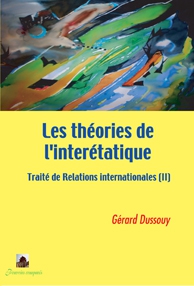 Hostile aux États-Unis d’Europe ou à une Europe intergouvernementale, l’auteur préconise un État européen, « fédération de régions (p. 148) ». Notons au passage qu’il méconnaît ou dévalorise le concept traditionnel d’Empire dont il fait un contresens évident. C’est regrettable, car son approche de la Res Publica europensis coïncide largement avec l’idée impériale européenne.
Hostile aux États-Unis d’Europe ou à une Europe intergouvernementale, l’auteur préconise un État européen, « fédération de régions (p. 148) ». Notons au passage qu’il méconnaît ou dévalorise le concept traditionnel d’Empire dont il fait un contresens évident. C’est regrettable, car son approche de la Res Publica europensis coïncide largement avec l’idée impériale européenne.
Favorable tant au plurilinguisme enraciné qu’au latin comme langue officielle de la République européenne, Gérard Dussouy soutient une fédération continentale de fédérations intermédiaires de régions qui se regroupaient suivant des affinités géographiques, culturelles, ethniques, linguistiques, voire économiques. Jugeant en outre que « l’unification complète et simultanée de toute l’Union européenne n’est pas concevable (p. 161) », il reprend les propositions de 1994 des conservateurs atlantistes allemands Karl Lammers et Wolfgang Schäuble, puis du gépolitologue Henri de Grossouvre en faveur d’« un “ noyau dur ” ou une “ Avant-garde ”, comprenant la France, l’Allemagne, la Belgique et le Luxembourg (p. 162) ». Il préférerait néanmoins que ce noyau dur se constitue à partir de la zone euro et de son fédéralisme budgétaire.
L’auteur observe finalement que « la France a toujours refusé les plans d’unification politique de l’Europe (p. 163) ». Afin de l’« européaniser », il entend la régionaliser grâce à une réforme administrative radicale. Il supprime les départements, réduit à quinze le nombre des régions au pourtour modifié (rattachement à la Bretagne de la Loire-Atlantique, unification de la Normandie, réunion des deux Bourgognes dont la Franche-Comté…), impose aux élus le mandat unique et limite l’hypercentralisation parisienne. Ces mesures osées permettraient à cette nouvelle France, dégagée d’un Outre-mer pesant, d’intégrer pleinement l’État souverain européen. Celui-ci développerait par conséquent non pas un soi-disant « patriotisme constitutionnel », mais plus vraisemblement un « patriotisme géographique (p. 176) ».
Promouvoir les régions autonomes d’une France libre dans une Europe indépendante et souveraine est une belle ambition. On comprend pourquoi Dominique Venner a accepté de préfacer de manière excellente ce livre.
Georges Feltin-Tracol
• Gérard Dussouy, Contre l’Europe de Bruxelles. Fonder un État européen, Tatamis, 2013, 187 p., 10 €.
Article printed from Europe Maxima: http://www.europemaxima.com
URL to article: http://www.europemaxima.com/?p=4162
00:05 Publié dans Affaires européennes, Géopolitique, Livre, Livre | Lien permanent | Commentaires (0) | Tags : gérard dussouy, géopolitique, livre, europe, affaires européennes, union européenne, eurocratie |  |
|  del.icio.us |
del.icio.us |  |
|  Digg |
Digg | ![]() Facebook
Facebook
La mise en place d’un système de propagande au niveau européen
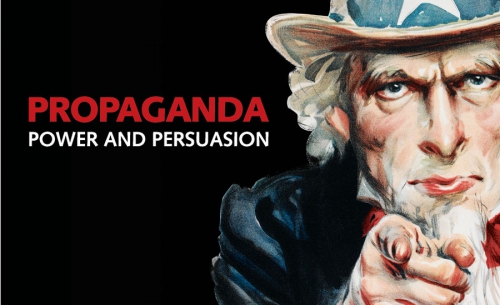
La mise en place d’un système de propagande au niveau européen
|
par Guillaume Borel Ex: http://www.lesmoutonsenrages.fr |
Il y a quelques mois, le média EUobserver signalait l’existence d’un document informel à l’initiative de la Grande-Bretagne, de la Lituanie, de l’Estonie et du Danemark, appelant à doter l’UE de moyens d’informations communs destinés à « déconstruire… la propagande hostile » que représenteraient les médias russes dans le cadre du conflit ukrainien. L’affrontement du bloc américano-occidental et de la Russie, a en effet permis de mettre à jour l’embrigadement des grands médias occidentaux sur les sujets géopolitiques et stratégiques et a permis à de nombreux citoyens européens à la recherche d’une information réaliste et factuelle de s’informer hors de la sphère d’influence américaine par le biais des grands médias russes, comme Russia Today, qui dispose maintenant d’une édition en langue française. La simple comparaison entre les informations déployées à l’intérieur du bloc OTAN et celles circulants hors de la sphère d’influence américano-occidentale, permet effectivement de prendre conscience de la propagande de guerre à l’oeuvre dans les médias européens et de leur manipulation de l’information.
Le document, probablement d’origine états-unienne, prévoyait donc la mise en place au niveau européen d’une « plate forme permanente au sein de laquelle l’UE et l’OTAN pourraient échanger leurs points de vue sur la communication stratégique » et appelait les producteurs médiatiques à « encourager les échanges entre les productions des différents pays (divertissements, films, documentaires) afin de fournir des alternatives compétitives à la production russe sur le marché européen de la télévision. »
Le conseil européen des 19 et 20 mars derniers, a adopté à cet effet une « feuille de route » concernant la mise en place des mesures préconisées par ce document, sous la supervision de la chef de la diplomatie européenne Federica Mogherini, dans le but « de superviser le nouveau programme d’envergure pour contrecarrer le travail des médias russes. »
Cette dernière a notamment déclaré le 19 janvier : “Nous travaillons sur la mise en place d’une stratégie de communication pour faire face à la propagande en langue russe“.
A cet effet, il est prévu de lancer un grand média en langue russe destiné à promouvoir la vision atlantiste dans la sphère d’influence de la Russie et à contrer Russia Today, sur le modèle des anciens médias opérés par la CIA du temps de la guerre froide, comme Radio Liberty ou Radio Free Europe. Le document, qui n’a pas été rendu public et serait classé « secret défense », mais dont certains éléments ont fuité, invite également les journalistes d’investigation à se rapprocher de structures telle que la European Endowment for Democracy, opérée par la CIA.
Russia Today, en tant que premier média international russe, est la cible privilégiée de cette campagne. En Grande-Bretagne, l’Office of communications, la structure de régulation des médias, a formulé en décembre un avertissement à Russia Today en menaçant de lui retirer sa licence si la chaîne ne tenait pas compte de ses remarques.
En début d’année, le rédacteur en chef du quotidien américain The Economist, Edward Lucas, a qualifié les employés de RT « d’excentriques et de propagandistes » et a appelé à leur boycott. Il a notamment affirmé : « Quiconque déposera son CV sur mon bureau et que je vois que cette personne a travaillé chez RT ou Sputnik ou quelque choses comme ça, alors ce CV sera jeté à la poubelle. Nous devons être capables d’humilier ces chaînes, ces personnes et les personnes qui les ont nommés, les producteurs qui les ont lancés et de les repousser en marge du monde des médias pour qu’on ne les considère plus comme de vrais journalistes ou de vraies chaînes mais comme des excentriques et des propagandistes. »
Un premier pas dans la mise en place d’une stratégie européenne de propagande de masse vient d’être effectué avec la signature d’une alliance entre sept grands quotidiens nationaux qui comprend Le Figaro, pour la France, La Republica pour l’Italie, El Pais pour l’Espagne, Le Soir pour la Belgique, La Tribune de Genève et Tages-Anzeiger pour la Suisse, et qui sera dirigée par Javier Moreno, ancien directeur de la rédaction d’El País. Les objectifs officiels sont « la mise en commun des compétences ainsi que la promotion du journalisme de qualité. »
Cette alliance a été nommée Leading European Newspaper Alliance (LENA) et elle s’est donnée pour objectif opérationnel de mettre en place une « plateforme d’entraide entre éditeurs pour partager leurs expériences à l’ère numérique« , c’est à dire qu’elle proposera une plateforme de mutualisation des contenus. Cette mutualisation aura pour conséquence une réduction de la diversité éditoriale et une uniformisation des contenus à l’échelle européenne, ce qui facilitera l’imposition et la circulation de la propagande atlantiste à l’échelle du continent. L’objectif affiché est ainsi de « faire émerger une opinion publique en Europe« …
Guillaume Borel
00:05 Publié dans Actualité, Affaires européennes, Manipulations médiatiques | Lien permanent | Commentaires (0) | Tags : actualité, europe, affaires européennes, propagande, manipulations médiatiques, totalitarisme, manipulation |  |
|  del.icio.us |
del.icio.us |  |
|  Digg |
Digg | ![]() Facebook
Facebook
Menaces sur les croisières en Méditerranée
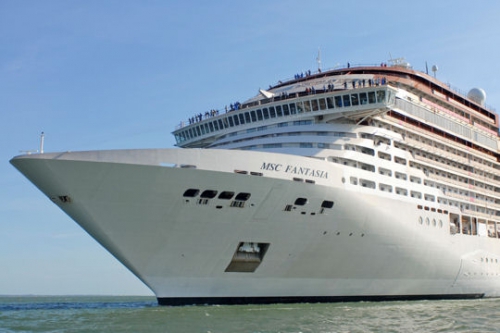
Jean Bonnevey
Ex: http://metamag.fr
Ce sont des croisiéristes à terre qui ont été attaqués en Tunisie. Mais comment ne pas se demander, si les croisières elle-même, en méditerranée notamment, ne seront pas bientôt des cibles. Cette hypothèse est de plus en plus évoquée par les spécialistes de la sécurité, même si elle n’est pas médiatisée pour ne pas provoquer d’affolement.
Ce sont des amiraux, ayant eu de hautes fonctions dans l'Otan, cités par Le Point, qui ont pointé du doigt la menace. «Si j'avais un yacht de plaisance et l'intention de naviguer cet été en Méditerranée, je serais inquiet pour ma sécurité», a ainsi déclaré l'amiral britannique Chris Parry. «Les côtes italiennes, les rivages européens les plus proches de la Libye, vont devenir des endroits à haut risque», a renchéri l'amiral américain Jim Stavridis. Pour lui, il n'y a aucune raison pour que la Méditerranée ne devienne pas, après l'océan Indien, le golfe de Guinée ou le détroit de Malacca, un nouveau terrain d'action pour la piraterie.
C’est vraie, il n’y a aucune raison, surtout finalement que ce ne serait que revenir à une situation antérieure. Retour possible donc à la case piraterie barbaresque. La prise d'esclaves serait simplement remplacée par la prise d’otages.
Barbaresque est un terme qui désignait les pirates opérant dans le bassin méditerranéen après la conquête musulmane. La durée de leur activité en mer Méditerranée est telle qu'elle peut être décrite depuis les premiers temps de l'Islam, alors associée à la conquête musulmane sur le continent européen, qui, une fois la péninsule ibérique prise, se prolonge par des incursions en Septimanie jusqu'à des prises de villes en Provence.
C'est par la seconde phase de l'ère coloniale que les puissances européennes vont mettre fin aux raids des pirates barbaresques, opérant depuis des cités de la côte sud de la Méditerranée, entre-temps passées sous domination ottomane.
Sur le plan géographique, le terme barbaresque correspond approximativement à l'aire du Maghreb actuel, connue sous le nom de côte des Barbaresques ; sur le plan historique, les siècles barbaresques recouvrent la période ottomane qui, pour l'Algérie par exemple, court de 1516, année de l'arrivée des frères Barberousse à Alger, à 1830 ; sur le plan démographique, le barbaresque désigne aussi bien les corsaires et marins originaires de cette aire géographique que les habitants du Maghreb.
Ce terme peu précis est péjoratif, à l'instar du terme sarrasin qui désignait aussi bien, au Moyen Âge européen, les Arabes que les Berbères d'Espagne. Il évoquait la réalité du sort très peu enviable fait aux chrétiens victimes de la traite des esclaves de Barbarie qui tombaient entre les mains des pirates lors des razzias et finissaient leur vie comme esclaves ou dans les bagnes d'Alger ou de Tunis. Un pan de l’esclavage peu mis en évidence, on se demande bien pourquoi ?
Au tout début du XVIème siècle, Khayr ad-Din Barberousse, amiral de l'Empire ottoman, est utilisé par François Ier dans sa lutte contre l'Italie Cependant, à la suite de l'échec de cette politique et de la Bataille de Lépante, les puissances européennes sont progressivement confrontées à l'impossibilité de naviguer en Méditerranée, soit à cause de rançonnement des marchandises, ou bien à cause de la prise d'esclaves, parfois rachetés.
Aussi, de nombreuses batailles navales ont lieu comme la Bataille du cap Celidonio en 1608 suivie d'une autre en 1616, la Bataille de Valona en 1638, le Bataille de Cherchell en 1665, la Bataille de Bougie en 1671. En France, Colbert entreprend de les combattre méthodiquement à partir de 1662.
Parallèlement, des ordres religieux comme les Trinitaires ou l'Ordre de Notre-Dame-de-la-Merci, déjà fondés depuis plusieurs siècles, tentent de racheter des esclaves chrétiens, aide qui s'intensifiera sous Louis XIV, libérant des centaines de prisonniers après parfois des décennies de captivité. Mais l'immense majorité reste captive: 600 000 à 1 000 000 au Maghreb sur la période 1530-1640.
Cette période prendra fin avec la prise de contrôle hégémonique des puissances européennes correspondant à la seconde phase de l'ère coloniale, au cours de laquelle ces pays installent sur les pays du Maghreb une tutelle coloniale. Associés à ces opérations militaires, les États-Unis connaissent deux épisodes de leur histoire militaire navale dénommés : "guerre de la côte des barbaresques" (Première guerre barbaresque), (1801–1805) et Seconde guerre barbaresque (1815). Ces opérations restent dans la mémoire comme un des premiers faits d'armes du corps des Marines.
Alors bien sûr pas d’amalgame…. Mais tout de même avec ce qui se passe, on a le droit de se dire que la pax européa imposée par la colonisation qui n’avait pas que des mauvais côtés, est aujourd’hui en danger et avec elle notre manière de vivre, ce qui inclut le tourisme et…. les croisières.
Le danger est réel …. Et le temps des barbaresques pirates musulmans n’est pas si ancien.
00:05 Publié dans Actualité, Affaires européennes | Lien permanent | Commentaires (0) | Tags : actualité, affaires européennes, europe, méditerranée, piraterie, pirates |  |
|  del.icio.us |
del.icio.us |  |
|  Digg |
Digg | ![]() Facebook
Facebook
mercredi, 25 mars 2015
Berlín se distancia de Washington sobre Ucrania
Por Diana Rojas
Ex: http://www.elespiadigital.com
El gobierno alemán está mostrando su creciente indignación por lo que considera como “una peligrosa propaganda” norteamericana para sabotear el cese el fuego en Ucrania. Los alemanes y otros europeos están preocupados por los intentos de, entre otros, el comandante supremo aliado de la OTAN en Europa, Philip Breadlove, y la secretaria adjunta del Departamento de Estado para Europa, Victoria Nuland, para exagerar la implicación rusa en el conflicto.
Responsables alemanes manifiestan, según el periódico norteamericano McClatchy, que los informes norteamericanos sobre la situación en Ucrania son totalmente inexactos o alegaciones sin confirmar. Cuando Breadlove afirmó que unos 40.000 soldados rusos se hallaban en la frontera preparando una invasión, fuentes de inteligencia europeas afirmaron que el número era de 20.000 y que no existía una intención de invadir.
Responsables europeos han rechazado también las afirmaciones de que unos 50 tanques rusos habían cruzado la frontera y señalaron que se trataba de un puñado de vehículos blindados y probablemente no militares en su origen.
Los informes alemanes señalan también una amplia diferencia en el número de rusos implicados en el conflicto del Donbass. Ellos estiman esta participación en unos 600, muy lejos de las cifras que ofrecen los comandantes norteamericanos de la OTAN y que rondan entre los 12.000 y los 20.000.
Sabotear esfuerzos de mediación alemanes
La revista alemana Der Spiegel se preguntó recientemente: “¿Quieren los norteamericanos sabotear los intentos de mediación europeos liderados por la canciller Merkel?” Esto en referencia al encuentro de Minsk entre Angela Merkel y el presidente francés, François Hollande, con el presidente ucraniano, Petro Porochenko, y su homólogo ruso, Vladimir Putin, para buscar un alto el fuego.
Esta disputa se produce en un momento en el que EEUU se dispone a enviar 75 millones de dólares en ayuda no letal a Ucrania, incluyendo 30 vehículos Humvee blindados y hasta 200 no blindados.
En las últimas semanas, la canciller alemana, Angela Merkel, parece frustrada con las propuestas que emanan del Congreso de EEUU y de partes de la Administración Obama para enviar armas a Ucrania, señalando que esto podría frustrar la oportunidad de hallar una solución diplomática y escalar la crisis.
Los responsables alemanes han advertido también que tras las visitas de políticos o militares estadounidenses a Kiev, los dirigentes ucranianos parecen más belicosos y optimistas sobre las perspectivas de que su Ejército pueda ganar el conflicto en el campo de batalla. “Nosotros tenemos luego que llevar a los ucranianos de vuelta a la mesa de negociaciones”, dijo un funcionario alemán.
Bob Lo, un experto sobre Rusia de la Chatham House de Londres, dijo que la disputa no es tanto sobre números sino sobre la forma en que el conflicto de Ucrania debe ser resuelto. Algunos responsables norteamericanos creen que sin una amenaza militar creíble las negociaciones de paz no tendrán éxito, mientras que los alemanes consideran que una amenaza de este tipo sólo serviría para escalar el conflicto.
Divergencia de intereses
Según el analista de la CIA Raymond McGovern se trata de la primera disputa seria entre Washington y Berlín desde la Segunda Guerra Mundial. Él señala que Alemania es capaz de enfrentarse políticamente a EEUU y tomar decisiones independientes por primera vez desde hace 70 años.
“Los alemanes han pasado de la adolescencia a la edad adulta y están dispuestos por primera vez en 70 años a hacer frente a EEUU y decirle: Nuestros intereses no coinciden con los vuestros. No queremos una guerra en Europa Central y tenemos la intención de evitarla”, indicó McGovern.
En realidad, esto demuestra la diferencia de intereses entre ambos países. La mitad del PIB alemán procede de las exportaciones y de ellas sólo el 40% va destinado ahora a la UE. Alemania busca y necesita los mercados de Asia, incluyendo países como Rusia, China e Irán, a los que ve como socios potenciales y no como rivales estratégicos, como hace EEUU.
Irritación norteamericana
Según Lo, numerosos funcionarios norteamericanos están insatisfechos de la política de Berlín y trabajan para hacer fracasar las iniciativas alemanes.
El ex director de la Agencia de Seguridad Nacional (NSA), Michael Hayden, declaró el 11 de marzo que la agencia nunca renunciará a espiar a los dirigentes alemanes sean cuales sean las consecuencias políticas. Hayden señala que la canciller alemana defiende ante todo los intereses alemanes y busca evitar una agravación de la situación en Ucrania, lo que Hayden parece lamentar.
Las revelaciones del ex agente de la CIA, Edward Snowden, sobre la actividad de los servicios secretos estadounidenses en Alemania provocaron un escándalo diplomático en el verano de 2013. La revista Der Spiegel señaló entonces que la NSA vigilaba 500 millones de conexiones telefónicas y de Internet en Alemania. En octubre de 2013, los medios anunciaron que Merkel estaba entre los espiados por los servicios de inteligencia estadounidenses. La canciller alemana ordenó entonces al servicio de inteligencia alemán BND y al Ministerio de Defensa reducir su cooperación con los estadounidenses.
00:05 Publié dans Actualité, Affaires européennes, Géopolitique | Lien permanent | Commentaires (0) | Tags : politique internationale, allemagne, états-unis, géopolitique, europe, affaires européennes |  |
|  del.icio.us |
del.icio.us |  |
|  Digg |
Digg | ![]() Facebook
Facebook
Le visage d'Eric Zemmour
par Julien Rochedy
Ex: http://www.rochedy.fr
Il faut regarder le visage d’Eric Zemmour de ces derniers jours pour comprendre que quelque chose s’est passé. Que quelque chose est passé. Sur lui, et aussi, par lui. Je me rappelle son visage lors de ses premières années en tant que star médiatique : Zemmour parvenait, en toutes circonstances, à conserver son air bon enfant, ses yeux rieurs et complices, y compris avec d’infâmes invités à qui il venait juste d’assener deux ou trois vérités. Zemmour, c’était le gentil mec, le sympathique, le seul qui pouvait faire rimer réactionnaire avec débonnaire, celui qui n’était pas d’accord avec la guimauve de la pensée télévisuelle, mais qui terminait toujours en riant, comme si, au final, tout cela n’était pas si grave. On a beaucoup glosé sur la judéité de Zemmour qui seule, semblait-il, le protégeait dans l’espace médiatique, compte tenu de tout ce qu’il pouvait y dire. On a beaucoup entendu que si Zemmour avait été un catholique blond aux yeux bleus d’un mètre quatre vingt, il eut été catalogué comme "nazi" et aussitôt exclu du PAF. Je crois que l’essentiel n’était pas là ; sa longévité, il la tenait plutôt de son côté accommodant, de son air bienveillant : il la tenait de son visage souriant.
N’importe quel personnage issu de son école de pensée (gaullo-bonapartiste, en somme : patriote), en face d’un BHL ou d’un Edwy Plenel, à l’écoute des mensonges des uns ou des naïvetés des autres, eut fini par sévèrement froncer les sourcils, par hausser la ton, par croiser les bras ou au contraire les déplier pour atteindre le nez de ceux d’en face. Pas Zemmour. Depuis 2003 qu’on le voit à la télévision jusqu’à aujourd’hui, jamais il ne fut grave, ou très rarement. On obtient tout avec une arme à la main disait Al Capone ; à la télévision, on obtient tout avec un sourire plaisant. Zemmour s’est battu des années contre la pensée moderne avec la meilleure des armes modernes, une arme féminine qui plus est : la gentillesse.
Grâce à elle, il est passé par toutes les mailles du filet, on l’a gardé, on l’a fait intervenir, on ne l’a pas vu venir, et au final, il les a tous battus. La société a changé, la gauche morale s’est écroulée – quelque chose s’est passé – Zemmour a triomphé chez les téléspectateurs. Et c’est alors que quelque chose s’est aussi passé sur le visage d’Eric Zemmour. Je le regarde depuis plus d’une semaine, tandis qu’il écume les plateaux télé pour la promotion de son livre Le suicide Français. Son visage s’est durci subitement, il ne sourit plus, ou moins, et il affronte avec une gravité nouvelle les attaques de tous les prêtres médiatiques qui sentent bien que c’est encore par aménité que Zemmour a parlé de suicide plutôt que de meurtre, sans quoi ils eussent tous été sur le banc des accusés. Le visage d’Eric Zemmour s’est transformé. Il parle désormais sans légèreté de la mort de ce qu’il aime passionnément, la France, son pays, son enfance, et ses rêves de maréchaux napoléoniens éclaboussant de gloire la grande nation. Il sait que tout cela est mort et n’a plus envie de le dire en riant pour faire plaisir aux Ruquier ou aux Domenach. Il parle désormais d’autorité, car il sait que les Français – je veux dire : ceux qu’il reste – sont avec lui et partagent, sinon ses vues, au moins son désarroi. Zemmour n’a plus à jouer désormais, il est devenu grave, plus sombre, plus solennel ; médiatiquement, il n’a plus de visage bon enfant ; c’est un homme maintenant. D’une certaine manière, ce visage est l’heuristique de l’époque dans laquelle nous sommes entrés, car le temps de la dérision est passé, révolu par la réalité dure et violente ; le tragique reprend peu à peu ses droits sur l’Histoire et le temps des hommes revient.
Zemmour, sans conteste, en est un.
00:05 Publié dans Actualité, Affaires européennes, Réflexions personnelles | Lien permanent | Commentaires (0) | Tags : eric zemmour, france, actualité, europe, affaires européennes, réflexions personnelles |  |
|  del.icio.us |
del.icio.us |  |
|  Digg |
Digg | ![]() Facebook
Facebook
mardi, 24 mars 2015
Exdirector de la CIA: "Se ha producido la mayor ruptura entre Alemania y EE.UU. desde la II Guerra Mundial"

Figuras como el exdirector de la CIA Michael Hayden no ocultan su malestar e intentan que Berlín rectifique su posición sobre el conflicto ucraniano porque los alemanes están actuando como adultos y no como siervos subordinados a la alianza de los 'cinco ojos' (EE.UU., Reino Unido, Canadá, Australia y Nueva Zelanda), sostiene el exoficial de la CIA Ray McGovern.
"La ruptura más significativa desde la Segunda Guerra Mundial entre Alemania y EE.UU. acaba de ocurrir", ha declarado el exoficial de la CIA Ray McGovern a RT. "Por primera vez en 70 años, los alemanes están saliendo de la adolescencia para entrar a la edad adulta; están dispuestos a hacer frente a EE.UU. y decirles 'mira, nuestros intereses no son los mismos que los vuestros, no queremos una guerra en Europa Central y vamos a evitarlo'", ha afirmado McGovern.
Asimismo, el exoficial ha revelado que el exdirector de la CIA está "muy instatisfecho estos días, especialmente con la actuación de la canciller alemana Angela Merkel porque ya no está actuando obedientemente al considerar en primer lugar los intereses de Alemania e impedir que empeore la situación en Ucrania".
"Hayden trata de decirle a Merkel y a todos los demás que están fuera de la alianza de los 'cinco ojos', que son ciudadanos secundarios y seguirán siéndolo mientras no obedezcan igual que lo hacen los otros cuatro (Reino Unido, Canadá, Australia y Nueva Zelanda)", ha advertido McGovern.
17:39 Publié dans Actualité, Affaires européennes, Géopolitique | Lien permanent | Commentaires (0) | Tags : actualité, europe, affaires européennes, géopolitique, politique internationale, allemagne, états-unis |  |
|  del.icio.us |
del.icio.us |  |
|  Digg |
Digg | ![]() Facebook
Facebook
Renaud Camus nous lit un conte prémonitoire d’Andersen
Discours de Renaud Camus (écrivain et président du Parti de l’In-nocence) aux assises de la liberté d’expression à Rungis le 15 mars 2015
Renaud Camus nous lit un conte prémonitoire d’Andersen
00:05 Publié dans Actualité, Affaires européennes, Littérature | Lien permanent | Commentaires (0) | Tags : renaud camus, andersen, liberté d'expressions, france, europe, affaires européennes, littérature, lettres, lettres françaises, lettres danoises, lettres scandinaves, littérature française, littérature danoise, littérature scandinave |  |
|  del.icio.us |
del.icio.us |  |
|  Digg |
Digg | ![]() Facebook
Facebook
lundi, 23 mars 2015
France, départementales: manipulation des sondages?
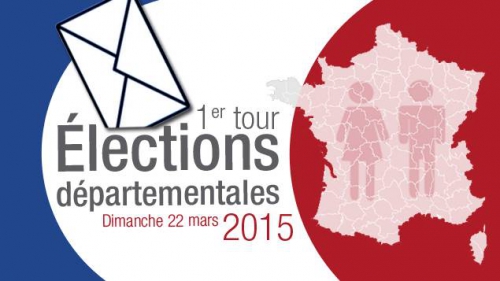
Raoul Fougax
Ex: http://metamag.fr
Le Front National est, dans les chiffres réels, le vainqueur du premier tour des départementales.Or, pendant toute la soirée électorale, les médias ont tenté de prouver le contraire.
Le Fn aurait été au-dessous de ses espérances et aurait perdu sa place de premier parti de France, un premier coup d’arrêt grâce à Manuel Valls ou à Nicolas Sarkozy, selon les commentateurs.
Comment une telle présentation, qui fait partie de la stratégie de barrage de l’idéologie médiatique, a-t-elle été rendue possible ? Tout simplement parce que le score du Fn à près de 26 % n’était pas celui prévu par les sondages entre 28 et 30 %. Depuis 15 jours, les politiques du système et leurs clones médiatiques ont joué sur ces chiffres pour faire peur aux électeurs. Cela n’a pas marché, mais cela a permis d’agiter un leurre.
Il est probable que les sondeurs aient volontairement -ils sont aussi des organismes idéologiques- surestimer le Fn pour provoquer un effet déception. Cette hypothèse de manipulation est analysée de très près au Fn bien sûr mais pas seulement. Il y a des indices concordant dans ce sens. Ce sera sans doute un sujet dans les prochains jours. Il y a des questions à poser aux sondeurs sur leurs méthodes mais qui les posera ? Libération en tout cas note que les sondeurs ont été des alliés objectifs de l'Ump sans aller encore plus loin.
C’est le différentiel, connu à l’avance par le pouvoir, qui a permis à Manuel Valls de se lancer dans une campagne anti-Fn dont il espérait être le grand bénéficiaire. Les résultats du Ps au premier tour et le désastre annoncé au second font capoter cette stratégie, encore plus fragilisée par l'émergence d’une gauche à la gauche de la gauche.
En ce qui concerne le titre de premier parti de France, là encore la manipulation est évidente. On a tout regroupé pour que le total de la Gauche soit presque au niveau du total de la Droite et que le Fn soit troisième.
Mais cela ne correspond à rien. Comment peut-on additionner les suffrages de ceux qui soutiennent la politique de Valls et de ceux qui veulent sa peau ? Quand à l'Ump, elle n’est premier parti de France qu’avec l’Udi et le Modem sans parler des divers droites dont certains candidats sont plus proches de Marine Le Pen que de Nicolas Sarkozy. Or, comme l'Udi et le Modem, sauf preuve du contraire, sont bien des partis, le Fn reste la premières formation de France, hors alliances électorales. C’est pourquoi la joie des médias audiovisuels a été de courte durée, car il a bien fallut ensuite parler des vrais chiffres qui confirment la poussée et l'implantation, du Fn. Le deuxième tour risque d’ailleurs, avec le ni-ni, de lui être plus favorable que prévu.
On a désormais le chiffre définitif : il y aura 314 triangulaires au second tour et même une quadrangulaire en Haute-Vienne. Il y aura aussi 1536 duels.
Nicolas Sarkozy, lui, peut se frotter les mains. Au soir du second tour, il aura gagné et il aura donné à l'UMP une victoire électorale. Ce sera peut être le vrai départ d’un retour qui était pour le moment assez raté. Même si Alain Juppé explique que c’est sa stratégie d'ouverture au centre qui a finalement gagné – c’est vrai- mais celui qui a remporté la bataille, ce n’est pas le stratège Juppé mais le tacticien Sarkozy.
Quand à Valls, il peut continuer à avoir peur. Valls, gardez vous à droite, Valls gardez vous à gauche !
17:57 Publié dans Actualité, Affaires européennes, Politique | Lien permanent | Commentaires (0) | Tags : politique, france, actualités, départementales françaises, europe, politique internationale, affaires européennes |  |
|  del.icio.us |
del.icio.us |  |
|  Digg |
Digg | ![]() Facebook
Facebook
Jean-Luc Addor (UDC) aux assises de la liberté d’expression
Discours de Jean-Luc Addor (avocat et député UDC du Valais) aux assises de la liberté d’expression à Rungis le 15 mars 2015
00:05 Publié dans Actualité, Affaires européennes | Lien permanent | Commentaires (0) | Tags : liberté d'expression, suisse, europe, affaires européennes |  |
|  del.icio.us |
del.icio.us |  |
|  Digg |
Digg | ![]() Facebook
Facebook
De la conquête européenne du pouvoir. Stratégie pour une refondation continentale
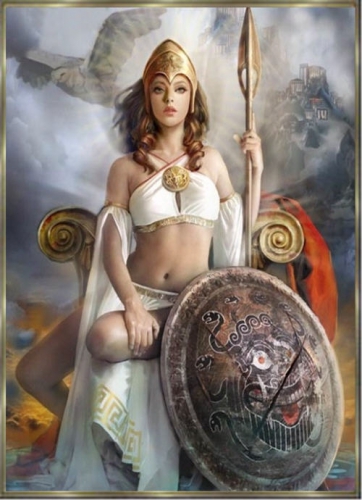
De la conquête européenne du pouvoir
Stratégie pour une refondation continentale
par Thomas Ferrier
Ex: http://thomasferrier.hautetfort.com
Constat.
Les pays européens sont confrontés à la montée des mêmes périls auxquels ils sont incapables d’opposer un front commun. L’Union « Européenne » actuelle est impuissante à les enrayer et en nie même l’existence, tout comme chaque Etat « national » pris séparément. Depuis un demi-siècle l’Europe vit sous la coupe de l’idéologie mondialiste, sur l’utopie universaliste mortifère, que ce soit sous le masque du libéralisme américain ou celui de l’internationalisme prolétarien. La Russie, libérée en 1991 de la dictature communiste, est seule aujourd’hui à tenter de s’opposer à ce diktat, mais elle est elle-même bien impuissante, ne pouvant offrir qu’une résistance symbolique. L’hiver démographique n’épargne aucun pays européen et même lorsque le taux officiel est satisfaisant, il masque le fait qu’il s’agit en partie d’une natalité d’importation, obtenue par le biais de flux migratoires post-coloniaux. Ces flux sont en passe de submerger littéralement la vieille Europe sans que celle-ci ne se dote des outils pour y parer, bien au contraire. Nombreux sont les relais internes à s’en féliciter. A cela s’ajoute une crise du chômage qui ne diminue que par une plus grande précarisation du travail. L’islam, qui était réduit en Europe dans les années 50 au Caucase et aux Balkans, est également apparu par le biais de ces flux dans tous les pays d’Europe occidentale, posant des problèmes de fond en matière de laïcité, d’identité et de sécurité.
La montée des populismes « nationaux », des souverainismes et des indépendantismes, est la conséquence logique de cette situation mais en aucun cas le signe d’une prochaine guérison, bien au contraire. L’égoïsme national est une chimère. Taper sur l’€ ou sur l’Union Européenne ne changera rien à la situation. Se replier sur des cadres nationaux dévoyés est un faux remède. Les nationalités ont perdu toute valeur, depuis que leur accès a été grandement facilité, même en Allemagne, jadis gardienne farouche de la sienne, tout comme a été dénaturée l’institution du mariage. Les constitutions enferment les peuples au lieu de les protéger. Un droit devenu fou restreint nos libertés. Et les Églises appellent à l’ouverture à l’autre au lieu de prôner la réaffirmation des valeurs européennes ancestrales.
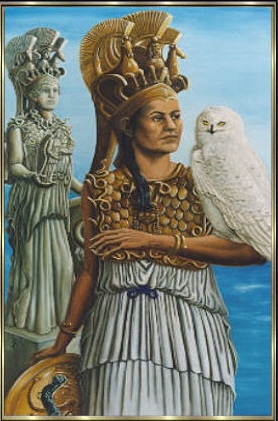 Dans un tel contexte, s’imaginer arriver au pouvoir à l’échelle d’un seul pays pour y changer quoi que ce soit est parfaitement naïf. Outre les carcans juridiques qu’il serait quasiment illusoire de faire sauter, les autres gouvernements, sans parler des USA, auraient tôt fait d’exercer des pressions économiques redoutables sur ce nouveau pouvoir récalcitrant. On a vu Syriza en Grèce, mouvement élu sur un programme démagogique, se coucher très vite devant la fameuse « Troïka » même si en paroles Tsipras fait croire à son peuple le contraire. Et ce serait la même chose si en France un mouvement de « droite nationale » par exemple s’imposait à l’issue d’élections démocratiques. Il se heurterait immédiatement au Sénat et au Conseil Constitutionnel qu’il ne serait en mesure de vaincre qu’en gagnant toutes les élections pendant cinq ans, alors qu’il aura déçu ses partisans les plus acharnés par son incapacité à agir immédiatement. Et je ne parle pas là des condamnations internationales qui mettraient l’économie française à genoux en une semaine à la moindre velléité d’un changement radical de paradigme.
Dans un tel contexte, s’imaginer arriver au pouvoir à l’échelle d’un seul pays pour y changer quoi que ce soit est parfaitement naïf. Outre les carcans juridiques qu’il serait quasiment illusoire de faire sauter, les autres gouvernements, sans parler des USA, auraient tôt fait d’exercer des pressions économiques redoutables sur ce nouveau pouvoir récalcitrant. On a vu Syriza en Grèce, mouvement élu sur un programme démagogique, se coucher très vite devant la fameuse « Troïka » même si en paroles Tsipras fait croire à son peuple le contraire. Et ce serait la même chose si en France un mouvement de « droite nationale » par exemple s’imposait à l’issue d’élections démocratiques. Il se heurterait immédiatement au Sénat et au Conseil Constitutionnel qu’il ne serait en mesure de vaincre qu’en gagnant toutes les élections pendant cinq ans, alors qu’il aura déçu ses partisans les plus acharnés par son incapacité à agir immédiatement. Et je ne parle pas là des condamnations internationales qui mettraient l’économie française à genoux en une semaine à la moindre velléité d’un changement radical de paradigme.
Les problèmes étant européens, ils ne peuvent être résolus qu’au niveau européen. Ce n’est qu’à l’échelle de l’Europe qu’un pouvoir disposerait de la masse critique donc des moyens réels de réorienter le continent dans un tout autre sens, sans avoir à tenir compte des constitutions, des traités ou des pressions internationales. L’Europe ne pourra être refondée sur une base démocratique et authentiquement européenne que par une forme de « putsch », par une révolution. Valéry Giscard d’Estaing et Helmut Schmidt ont évoqué la nécessité d’un tel « putsch européen », dont l’antichambre ne pourrait être que le parlement européen. En clair, on ne peut réorienter l’UE que de l’intérieur, après en avoir forcé les portes par le soutien des électeurs, et ainsi l’amener à ce qu’elle aurait dû être et qu’elle n’a pas pu ou su devenir. L’Union Européenne sera ainsi « malgré elle » l’antichambre de l’Europe Nation.
Solution.
Qui dit problème européen, dit solution européenne. Qui dit solution européenne, dit programme européen. Qui dit programme européen, dit parti européen, car une coalition de partis nationaux serait incapable d’opposer un front uni, et on le constate avec l’incapacité des partis souverainistes à s’entendre (quatre groupes au moins à Strasbourg), sans parler des querelles de personnes. Qui dit parti européen, dit enfin leader européen.
Bâtir un programme européen qui aurait à cœur la défense de l’identité européenne (européanité) et de toutes les identités subsidiaires de l’Europe (régionales et nationales), c’est donc le proposer aux électeurs européens par le biais d’un parti identitaire européen, un mouvement d’union et de défense des Européens indigènes, un mouvement d’opposition au mondialisme et au « multikulti » en provenance des USA.
La seule stratégie possible c’est de s’appuyer sur les électeurs européens, donc de les convaincre, et de jouer la carte des élections européennes. L’objectif est d’obtenir un maximum de députés à Strasbourg, au moins 30%, élus dans toute l’Union Européenne sur la même ligne programmatique. A ce moment là, la droite et les derniers nationalistes ou souverainistes se rallieront, par opposition à une « gauche » de plus en plus étrangère aux intérêts réels des Européens et pactisant avec ce qui détruit notre civilisation.

Avec plus de 50% des députés, élus ou ralliés, les institutions européennes deviendront ingouvernables. Le président de l’assemblée ne sera plus élu par une union factice entre PPE et PSE. Le parlement sera clivé entre le camp de l’Europe et le camp de l’Anti-Europe. La majorité parlementaire pourra alors s’autoproclamer assemblée européenne constituante, élaborant la constitution d’un nouvel Etat qui s’appellera l’Europe. Cet Etat, vierge juridiquement par nature, puisque créé « ex nihilo », ne sera pas engagé par les constitutions et les traités d’Etats qui auont à ses yeux cessé d’exister, comme en 1789 les parlements régionaux ont disparu. Bien sûr certains gouvernements tenteront de s’y opposer, d’entrer en résistance. Mais la plupart céderont, abandonnés de l’intérieur, et de leur propre chef se démettront. Ils sont incapables de résister au mondialisme. Ils seront encore moins capables de s’opposer à cette vague révolutionnaire européenne.
Ainsi verra le jour un gouvernement européen provisoire, une sorte de comité de salut public destiné à fonder l’Etat européen unitaire et à proposer une constitution aux citoyens européens. Il devra avoir à cœur de défendre comme point de départ ce que je nomme le « projet Périclès ». Il s’agit de la mise en place d’une nationalité européenne indépendante des nationalités des (anciens) Etats, bien trop dévoyées, par application de critères de convergence, par exemple une date de référence, une époque où les nationalités des Etats avaient encore un sens. Cette nationalité européenne reposerait sur le principe du ius sanguinis intégral, un principe d’ascendance, par patrilinéarité et matrilinéarité associées.
Un autre principe sera celui de l’exclusivité citoyenne, qui existe au niveau du droit de vote ou de l’accès à la fonction publique dans la plupart des pays européens. En démocratie, le citoyen est en effet lié à des droits et des devoirs exclusifs. Cette exclusivité devra être élargie à plusieurs domaines sociaux clé, par exemple le droit de propriété du sol ou le droit au travail, afin d’encourager un phénomène remigratoire.
C’est ainsi qu’un Etat européen, que la nation européenne dans un sens politique, pourra voir le jour. Une fois la constitution adoptée par référendum, des élections européennes auront lieu dans le cadre de la nouvelle organisation politique du continent.
Cet État invitera les autres pays européens non membres de la nouvelle Europe, et notamment la Russie, à envoyer des représentants afin de s’associer et de la rejoindre à plus ou moins brève échéance. Ils intégreront alors la première puissance mondiale et se verront immédiatement traités des maux que leur Etat « national » était incapable de résoudre, à supposer qu’il en ait eu l’intention. Il faudrait considérer cet Etat européen comme un remède continental dont l’application guérira notre civilisation et nous donnera les moyens d’une nouvelle renaissance. Un droit européen au service des Européens se sera substitué à d’anciens droits « nationaux » devenus des étaux. Les anciens traités, les anciennes constitutions, auront alors disparu. L’Europe pourra enfin envisager un avenir rayonnant, alors qu’en 2015 il est plus que sombre.
Le sacrifice des anciennes souverainetés nationales, qui avaient été vidées de toute réalité objective depuis des décennies, fantômes qu’on invoquait comme tant de fétiches, aura été le prix à payer, un prix à payer symbolique. L’OTAN aura cessé d’exister au profit d’une armée européenne et la géopolitique américaine visant à diviser l’Europe et à rejeter la Russie en Asie aura alors été rendue vaine. Ainsi l’Europe, qui aura alors échappé à l’extinction que le mondialisme lui promet, et qui aura su trouver en elle cette unité que les souverainistes lui refusent, sera sauvée. Et son identité plurimillénaire avec elle.
Thomas FERRIER (PSUNE)
00:05 Publié dans Affaires européennes | Lien permanent | Commentaires (0) | Tags : europe, affaires européennes, union européennes, thomas ferrier, stratégie, géopolitique, politique internationale |  |
|  del.icio.us |
del.icio.us |  |
|  Digg |
Digg | ![]() Facebook
Facebook
dimanche, 22 mars 2015
L’Affaire Valeurs Actuelles: la liberté de la presse menacée
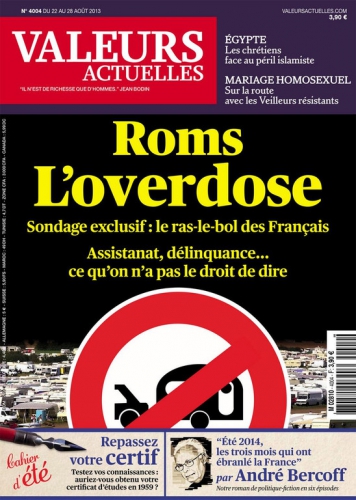
L’Affaire Valeurs Actuelles: la liberté de la presse menacée
Cela fait maintenant plusieurs fois que l’hebdomadaire Valeurs Actuelles, qui existe depuis plus de quarante ans, est attaqué et condamné en justice. Manifestement, il dérange le pouvoir. D’autant plus que, depuis que les socialistes sont aux affaires, l’hebdomadaire de droite, qui ne pratique pasla langue de coton aseptisée de ses confrères des grands médias, connaît une explosion insolente de ses ventes. Insupportable pour une oligarchie qui n’admet la liberté d’expression que si elle est cantonnée à ses rangs et à un éventail idéologique limité. Ou si elle s’exprime de manière confidentielle.
VA devenu emblème de la mise au pas des médias
Les faits sont assez inquiétants pour la liberté de la presse. Depuis quelques mois, à plusieurs reprises, VA et son directeur de publication, Yves de Kerdrel, sont condamnés à des amendes pour des couvertures ou des articles ”politiquement incorrects”. La dernière condamnation, début mars, est la seconde de l’année en moins d’un mois, avec trois mises en examen.
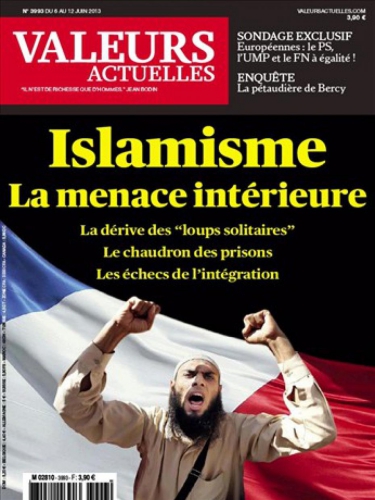 Cible de la première condamnation de la 17e chambre sur plainte de SOS Racisme et autres associations ”antiracistes” : une couverture où l’on voyait une Marianne voilée, pour dénoncer l’islamisation, l’immigration de peuplement colonisatrice et la complicité des pouvoirs ”républicains”. La dernière condamnation, le 5 mars, (3.000 € d’amende pour Y. de Kerdrel) concerne un reportage sur les campements illégaux de Rom, où des riverains interviewés avaient jugé qu’il s’agissait d’un « fléau » et d’une « plaie ». Dire cela est jugé comme un délit raciste, une ”provocation à la haine, à la discrimination et à la violence”. En plus de l’amende, le directeur de l’hebdo est condamné à verser 2.000 € à la Licra, qui alimenteront son fonds de commerce.
Cible de la première condamnation de la 17e chambre sur plainte de SOS Racisme et autres associations ”antiracistes” : une couverture où l’on voyait une Marianne voilée, pour dénoncer l’islamisation, l’immigration de peuplement colonisatrice et la complicité des pouvoirs ”républicains”. La dernière condamnation, le 5 mars, (3.000 € d’amende pour Y. de Kerdrel) concerne un reportage sur les campements illégaux de Rom, où des riverains interviewés avaient jugé qu’il s’agissait d’un « fléau » et d’une « plaie ». Dire cela est jugé comme un délit raciste, une ”provocation à la haine, à la discrimination et à la violence”. En plus de l’amende, le directeur de l’hebdo est condamné à verser 2.000 € à la Licra, qui alimenteront son fonds de commerce.
François d’Orcival, membre de l’Institut, président du comité éditorial de l’hebdomadaire, écrit : « cette campagne systématique contre la liberté d’expression de ce journal est inique et insupportable ». Effectivement. Mais il ne s’agit pas seulement d’une campagne contre VA. Par contrecoup, c’est un signal, un avertissement contre tous ceux qui voudraient ”abuser” de la liberté d’expression. Autrement dit, on ne s’en prend pas seulement à la liberté d’expression de Valeurs Actuelles en tant que tel, mais, par intimidation, à celle de tous les médias d’information et d’opinion qui seraient tentés d’imiter la dissidence et le parler vrai de VA. Le coup de sifflet du gendarme vaut pour tout le monde.
Le prétexte obsessionnel du ”racisme”
À chaque fois qu’un procès concernant la liberté d’expression (presse, édition et audiovisuel) est engagé, il s’agit toujours du même sujet, obsessionnel chez les censeurs : cela touche au supposé ”racisme”, à l’immigration, à l’ ” islamophobie”, à la criminalité des délinquants d’origine immigrée. Tout se passe comme si, progressivement, on cherchait à criminaliser et à dissuader tout discours contre l’immigration de colonisation, contre l’islamisation, contre les comportements des immigrés, à la fois victimisés et intouchables.
Point notable : jamais contre le racisme anti-Blancs ou l’antisémitisme des musulmans de pareilles actions ne sont engagées ; où en est la Licra contre les vomissements quotidiens antisémites des intéressés ? Nulle part. Encore moins le Mrap. Le racisme et l’antisémitisme sont censés être le monopole des ”petits Blancs”, du FN, de la presse de droite, etc.
Le rôle des associations-cerbères ”antiracistes”, chiens de garde des dogmes et de la vulgate Arrêtducrime (« Stop The Crime » du politiquement correct américain), est de rester sur un qui-vive et une vigilance sourcilleuse et de multiplier les actions judiciaires – financièrement juteuses – contre les contrevenants au dogme. Mme Taubira veut même introduire dans la loi les ”actions de groupe” contre les ”discriminations” supposées et les propos incorrects.
L’ ”antiracisme”, mot valise, est un prétexte. On impute ce délit imaginaire aux dissidents, le ”racisme”, pour neutraliser et dissuader toute critique de la politique du pouvoir en matière d’immigration. L’ ”islamophobie” joue le même rôle. De même que l’”homophobie”. Ces incantations, qui polluent la sphère du droit, visent à criminaliser toute opposition sérieuse. C’est le sophisme sartrien, hérité des méthodes communistes : il faut faire taire les « salauds ». C’est-à-dire ceux qui défendent l’identité de leur pays.
La ligne éditoriale et l’orientation de VA a tout pour déplaire au pouvoir, dans tous les domaines : politique, économique, culturel, idéologique, diplomatique (affaire ukrainienne), etc. Sans importance en cas de petit tirage. Insupportable en cas de diffusion nationale en progression constante. Le procès pour ”racisme” en choisissant comme angle d’attaque l’immigration et l’islamisation est une technique de neutralisation de l’ensemble d’un organe d’information par terrorisme intellectuel et moral.
Les raisons du ciblage répressif contre Valeurs Actuelles
Valeurs Actuelles est victime de son succès, parce que les idées et les analyses que ce magazine véhicule, pratiquement les seules de la grande presse à échapper à l’étouffoir du discours bien-pensant (à l’exception de Zemmour et de Rioufol dans Le Figaro, eux aussi inquiétés) séduisent de plus en plus de lecteurs. Ses ventes explosent. Un fanzine, un petit magazine ou un média audiovisuel incorrects (il en existe un certain nombre) qui ont de faibles audiences, risquent peu. VA a franchi la ligne rouge, le plafond de l’audience, au delà desquels le pouvoir répressif et censeur attaque. Le vautour cherche de grosses proies. Il ne se disperse pas en menu fretin.
Le but des offensives répétées contre Valeurs Actuelles n’est pas seulement de mettre au pas cet hebdo dissident, le seul parmi ses confrères des newsmagazines qui ose appeler un chat un chat, mais de provoquer un effet dissuasif contre les autres organes des grands médias (écrits, audiovisuels ou numériques) au cas où ils seraient tentés de franchir la ligne jaune du politiquement correct ; et de sortir du strict encadrement de l’idéologie dominante. Valeurs Actuelles sert de laboratoire à un dispositif général de contrôle soft-totalitaire de l’expression publique.
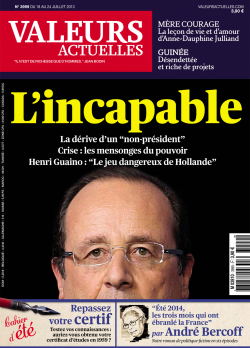 Ce qui affole le pouvoir, c’est que depuis que VA a fait le choix éditorial d’une opposition frontale et polémique à l’oligarchie et à ses politiques, tous les thèmes qui font mal sont abordés : l’immigration, l’islam, l’école, la criminalité, l’économie, etc. Avoir vertement critiqué Mme l’icône Taubira, l’intouchable passionaria incompétente de la Place Vendôme, (« coupable d’aveuglement, de laxisme, d’incompétence », en couverture) est une circonstance aggravante. C’est d’ailleurs elle qui est à la manœuvre derrière les plaintes des associations contre l’hebdomadaire. Dans tous les domaines, ce dernier fait désordre. Et plus il fait désordre, plus il vend. Cette équation n’est pas tolérable. Il faut prendre le risque de sortir du bois et de s’attaquer ouvertement à la liberté de la presse. Les associations plaignantes spécialisées sont évidemment de connivence avec le gouvernement. Ce dernier avait décidé de punir VA, pour faire un exemple.
Ce qui affole le pouvoir, c’est que depuis que VA a fait le choix éditorial d’une opposition frontale et polémique à l’oligarchie et à ses politiques, tous les thèmes qui font mal sont abordés : l’immigration, l’islam, l’école, la criminalité, l’économie, etc. Avoir vertement critiqué Mme l’icône Taubira, l’intouchable passionaria incompétente de la Place Vendôme, (« coupable d’aveuglement, de laxisme, d’incompétence », en couverture) est une circonstance aggravante. C’est d’ailleurs elle qui est à la manœuvre derrière les plaintes des associations contre l’hebdomadaire. Dans tous les domaines, ce dernier fait désordre. Et plus il fait désordre, plus il vend. Cette équation n’est pas tolérable. Il faut prendre le risque de sortir du bois et de s’attaquer ouvertement à la liberté de la presse. Les associations plaignantes spécialisées sont évidemment de connivence avec le gouvernement. Ce dernier avait décidé de punir VA, pour faire un exemple.
ll ne s’agit d’ailleurs pas, dans cette affaire et d’autres semblables, de censure stricto sensu, mais de punition judiciaire a posteriori, qui vise à provoquer, par dissuasion une autocensure. De manière à ce que, à la longue, dans les médias, les sujets qui fâchent ne soient jamais abordés, les problèmes réels ne soient jamais sérieusement traités, notamment l’immigration incontrôlée et toutes ses conséquences. Sujet tabou par excellence pour tous ceux qui, pour de multiples raisons (idéologiques, électorales, etc.) veulent que la France change de composition ethno-culturelle.
Les procès contre Valeurs Actuelles sont inquiétants parce qu’ils montrent que le pouvoir ne supporte plus la contestation de fond et cherche à l’éliminer par la répression judiciaire. Un média grand public met le doigt dans la plaie : c’est insupportable. La justice, aux ordres, doit frapper. D’ailleurs, la gauche, qui croit détenir les Tables du Bien, a toujours utilisé la répression pour imposer ses lubies. Les incroyables pertes de contrôle de M. Manuel Valls et de Mme Taubira, qui vont jusqu’à manier l’injure, confirment ce sectarisme émotionnel. Ce dernier se déverse avec une parfaite bonne conscience.
Mais à toute chose malheur est bon. L’acharnement judiciaire contre Valeurs Actuelles indique un système aux abois qui n’a d’autres arguments que la répression. Les héritiers gauchistes et libertaires de Mai 68, aujourd’hui au pouvoir, sont les frères de lait des fascistes, leurs ennemis intimes. Un pouvoir répressif, à court d’arguments, est, à terme perdant. Mais…
Le recul du droit positif et la tentation totalitaire
Mais ils peuvent devenir dangereux, car ils sont de plus en plus tentés de s’en prendre aux libertés publiques, ces fameuses ”libertés républicaines”, d’autant plus encensées qu’on les foule aux pieds : menaces sur la liberté de la presse et d’opinion (”racisme”, ”homophobie”, ”sexisme”, etc., toujours imputés aux Français de souche, jamais à leurs véritables auteurs) ; lois SRU durcies, discriminations positives de nature ethnique avec préférences et quotas, carte scolaire, lois sur la parité, etc.
J’ai discuté de l’affaire Valeurs Actuelles avec une journaliste américaine, correspondante du New York Times à Londres. Ni elle-même, ni sa rédaction ne partagent évidemment les points de vue de VA ou les miens. Mais elle a formulé cette réflexion : ” cette répression de la liberté d’expression est scandaleuse et impensable aux USA. Chez nous, un média est libre d’accepter ou de refuser une opinion. C’est une affaire privée. Mais ni la justice ni l’État n’ont à se mêler de quoi que ce soit. Un procès contre un article, une couverture, un propos médiatisé, quels que soient leur message, c’est proche du nazisme, du communisme, ça bloque le débat et c’est contre-productif. ” Pour elle, la liberté d’expression est menacée, écornée en France sur un nombre grandissant de sujets.
Ce qui est patent dans cette répression judiciaire contre VA, c’est qu’elle contraste avec l’énorme mobilisation en faveur de cette ”liberté d’expression” à la suite des attentats islamiques contre Charlie Hebdo. On mesure à quel point c’était une imposture. Les caricatures de Mahomet par Charlie Hebdo n’ont jamais été poursuivies par la justice (et heureusement) mais les couvertures de VA montrant une Marianne voilée le sont. Pourquoi ? Parce que Charlie Hebdo est gauchiste et que Valeurs Actuelles et de droite. Et parce que la justice française est en partie politisée et partiale, soumise à l’idéologie dominante, ce qui n’est pas nouveau dans notre histoire (1) .
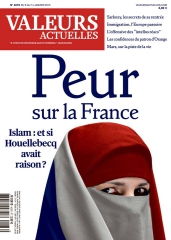 Il faut bien savoir que le pouvoir oligarchique et l’idéologie qui nous gouvernent, avec leurs relais dans la justice, sont souterrainement hostile à la liberté d’expression. Il s’agit du double héritage du marxisme et d’une partie de la Révolution française : ”pas de liberté pour les ennemis de la liberté ”. Ce qui signifie : pas de liberté d’expression pour ceux qui n’ont pas nos idées, les seules morales. Ils sont le Mal, ils sont illégitimes. L’important n’est pas qu’ils disent la vérité, car cette dernière ne compte pas : une vérité incorrecte est haïssable et illégitime, pas une erreur correcte.
Il faut bien savoir que le pouvoir oligarchique et l’idéologie qui nous gouvernent, avec leurs relais dans la justice, sont souterrainement hostile à la liberté d’expression. Il s’agit du double héritage du marxisme et d’une partie de la Révolution française : ”pas de liberté pour les ennemis de la liberté ”. Ce qui signifie : pas de liberté d’expression pour ceux qui n’ont pas nos idées, les seules morales. Ils sont le Mal, ils sont illégitimes. L’important n’est pas qu’ils disent la vérité, car cette dernière ne compte pas : une vérité incorrecte est haïssable et illégitime, pas une erreur correcte.
Cette confusion entre légitimité (idéologique et morale) et légalité (juridique et démocratique) plombe le droit français. L’Affaire Valeurs Actuelles et ses procès à répétition montrent ainsi que la liberté de la presse et la liberté d’expression sont peu à peu rongées dans une France où s’installe progressivement une répression sous couvert d’idéologie de la ”tolérance”. Extraordinaire inversion orwellienne. Le drame, c’est que la justice, avec souvent des magistrats politisés, voire fanatisés, oublieux du droit positif romain (notre tradition), est en train de perdre son objectivité et sa sérénité. Nous entrons doucereusement dans un droit subjectif et idéologique, de type néo-médiéval.
En effet, non seulement les lois réprimant le ”racisme”, les discriminations et les incitations à la haine, etc. sont floues et imprécises, mais leur interprétation est arbitraire, à la tête du client. C’est, au sens strict, une sortie de l’ ”État de droit”, c’est-à-dire de celui qui garantit des règles du jeu objectives et prévisibles. L’insécurité juridique a toujours été l’arme des despotismes, afin de bâillonner les critiques. Quand l’autorité punitive est imprévisible, les justiciables en deviennent d’autant plus prudents. Les opposants font profil bas et se taisent. Et les choses ne peuvent que s’aggraver.
Valeurs Actuelles en première ligne : le courage d’aller jusqu’au bout ?
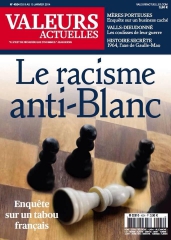 Faire taire les dissidents par l’intimidation de basse intensité (amendes, dommages et intérêts) est toujours la première phase de la répression. La seconde est plus dure mais elle est inévitable si l’on persiste. C’est la dissuasion par d’autres méthodes, disons non juridiques pour faire bref. La panoplie est riche.
Faire taire les dissidents par l’intimidation de basse intensité (amendes, dommages et intérêts) est toujours la première phase de la répression. La seconde est plus dure mais elle est inévitable si l’on persiste. C’est la dissuasion par d’autres méthodes, disons non juridiques pour faire bref. La panoplie est riche.
La mobilisation pour la ”liberté d’expression” à la suite de l’assassinat de la rédaction de Charlie Hebdo par les djihadistes est un enfumage hypocrite. La liberté d’expression est accordée par le système en fonction de la couleur idéologique de celui qui la revendique. On n’a pas vu de grands médias se solidariser avec force en faveur de Valeurs Actuelles à la suite de ces condamnations judiciaires. Ne serait-ce que pour défendre leur propre liberté d’expression future. Seraient-ils aux ordres ? Disons que pour moitié, ils ont peur et s’autocensurent, et, pour l’autre, ils sont acquis (par sincérité ou conformisme) à la vulgate aseptisée. Ils ne veulent pas d’histoires, pas de problèmes, ce sont des ”modérés”. Futurs vaincus, futurs soumis. Perroquets avec chaine à la patte.
L’hebdomadaire a l’intention de résister donc d’affronter les pouvoirs répressifs, à ses risques et périls, et à ne pas céder à l’intimidation : « témoigner des maux qui défont la France, dénoncer la politique de destruction socialiste et continuer à porter la plume dans les plaies violemment infectées de notre si cher pays. Quoi qu’il nous en coûte, vous pouvez compter sur nous », écrit Kerdrel. C’est une attitude courageuse mais c’est aussi la meilleure en terme de communication politique. Car, dans sa bêtise fanatique, le pouvoir n’a pas compris qu’en s’acharnant sur Valeurs Actuelles, il a mis en lumière sa position de dissidence et de résistance et contribue à augmenter son audience. Néanmoins, il espère que, malgré tout, VA mettra désormais la pédale douce et sera intimidé. Nous verrons bien.
Note:
(1) Pensons à ces épisodes de la période de l’Occupation puis de la Libération où d’éminents membres des corps judiciaires –mais aussi administratifs, policiers et militaires – ont changé de camp et d’opinion sans vergogne, en fonction des rapports de force. La chose s’était déjà produite au moment des changements de régime au XIXe siècle : 1815, 1848, 1870. La belle idée d’une justice française impartiale et apolitique ne correspond pas à la réalité historique et sociologique.
12:09 Publié dans Actualité, Affaires européennes, Nouvelle Droite | Lien permanent | Commentaires (0) | Tags : guillaume faye, nouvelle droite, france, valeurs actuelles, censure, état policier, totalitarisme, liberté d'expression, europe, affaires européennes |  |
|  del.icio.us |
del.icio.us |  |
|  Digg |
Digg | ![]() Facebook
Facebook



